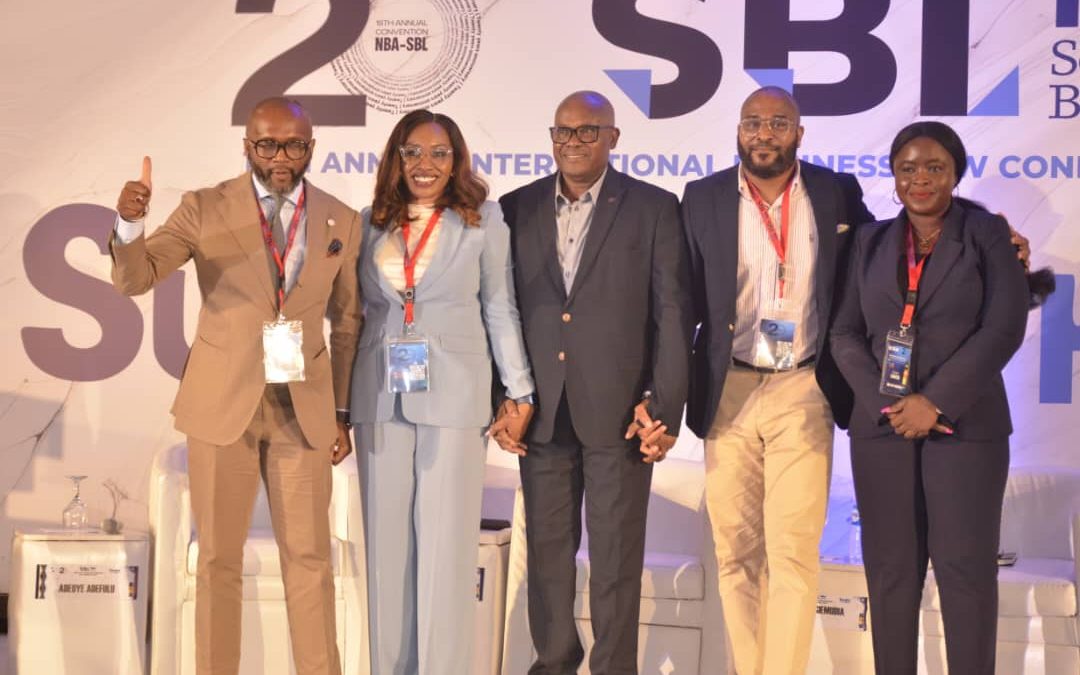
by Legalnaija | Jul 2, 2024 | Uncategorized
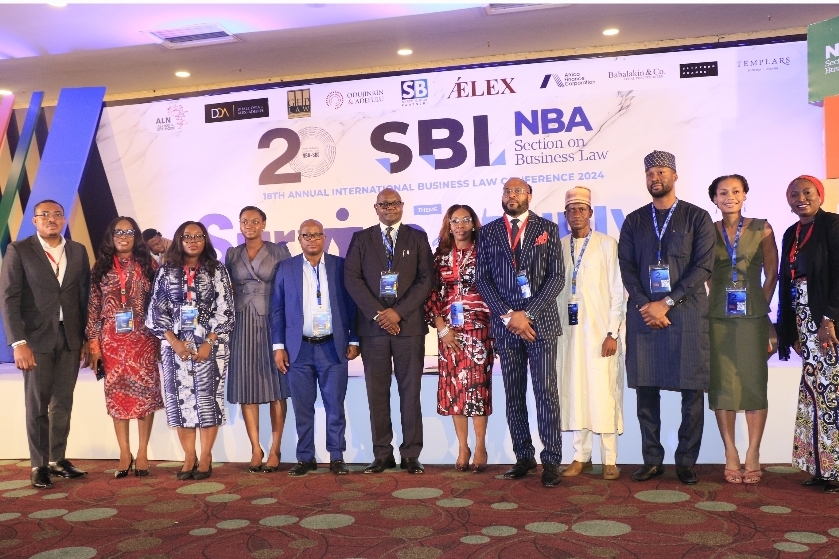
The Nigerian Bar Association Section on Business Law (NBA-SBL) concluded its 18th Annual International Business Law Conference on the 28th June, wrapping up a series of dynamic and informative sessions designed to empower legal practitioners and businesses. Themed “Survive and THRIVE,” the conference provided attendees with critical insights into various aspects of business law and the economy.
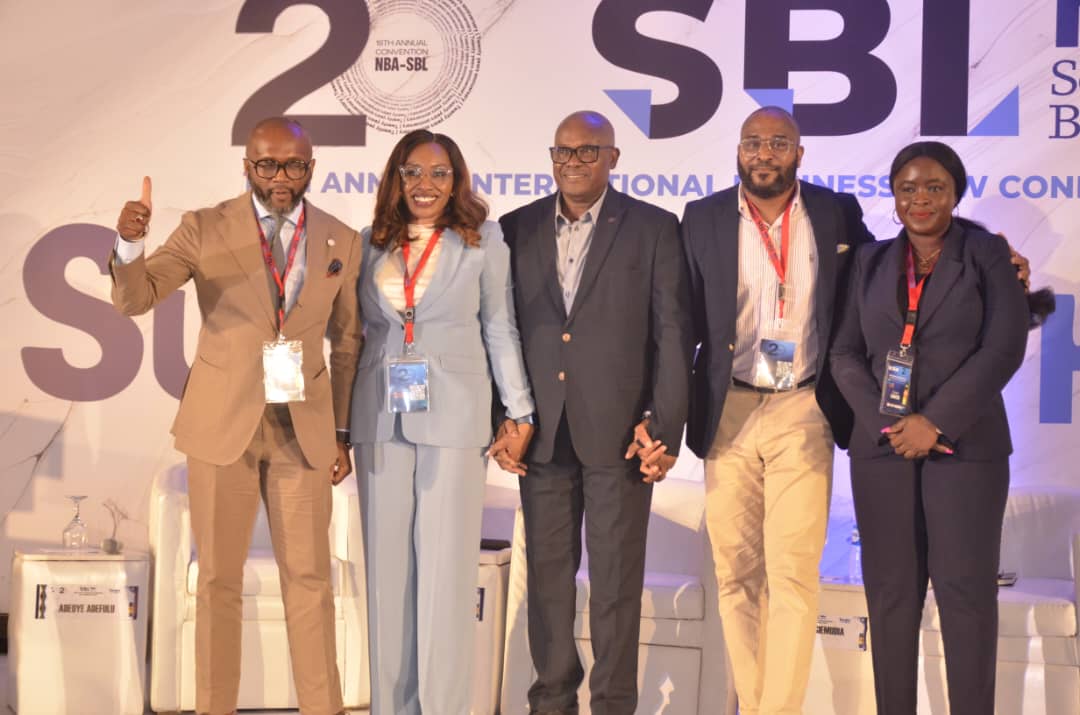
The day began with breakout sessions:
Breakout Session 1: Tackling the Power Deficit – Is Renewable Energy the Solution?
Moderated by Mrs. Dolapo Kukoyi, this session explored renewable energy as a potential solution to Nigeria’s power deficit. Speakers included Mr. Seyi Bioku (virtual attendance), Mr. Dafe Akpeneye, Ms. Ozim Ifeoma Ibeziako, Ms. Ozioma Agu, and Mr. Abba Aliyu.
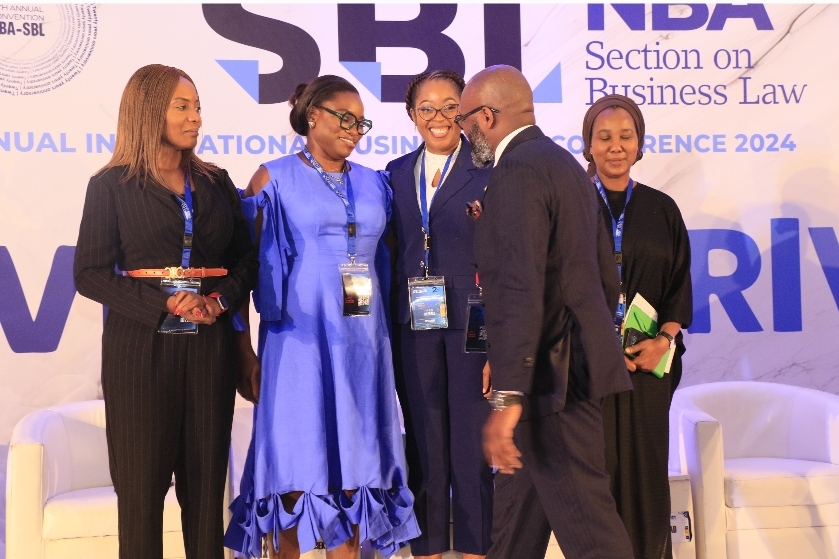
Breakout Session 2: Infrastructure Development and Economic Sustainability – A Case for Special Economic Zones
Moderated by Mr. Dapo Oduwole, this session examined the role of special economic zones in driving infrastructure development and economic sustainability. Panelists included Dr. Olufemi Ogunyemi, Mrs. Bolatito Ajibode, Mr. Mu’azu Musa Sahabi, Mr. Abiola Osho, and Mr. Yomi Ademola.
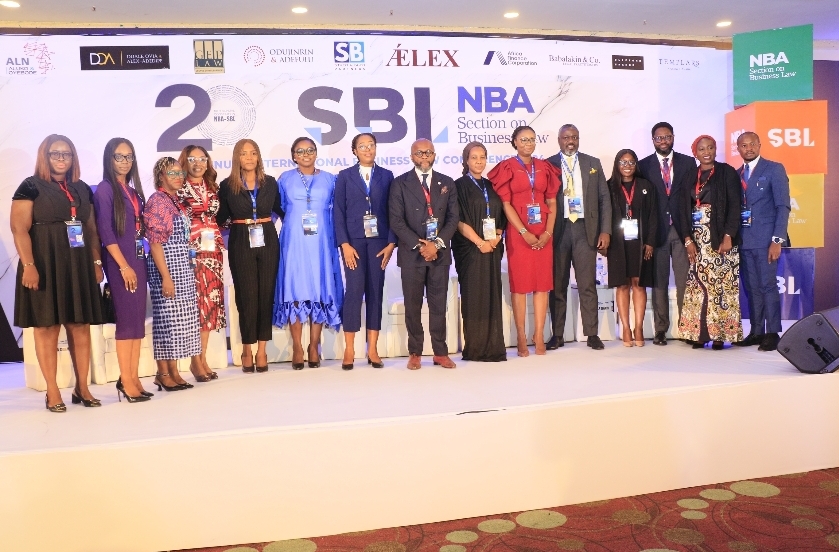
Breakout Session 3: Cybersecurity & Data Privacy in the Age of AI – Legal Considerations
Moderated by Mr. Olatunji Muritala, this session focused on the legal implications of cybersecurity and data privacy in the era of artificial intelligence. Speakers included Mr. Olumide Babalola, Ms. Rachel Magege (virtual attendance), Mr. Noble Obasi, Mrs. Ngozi Aderibigbe (virtual attendance), Mr. Victor Famubode, and Ms. Adamma Isamade.
Breakout Session 4: Balancing Act – Responsible Gambling Regulation in a Thriving Sports Betting Industry
Moderated by Mr. Ayokunle Adetula, this session addressed the regulatory challenges and responsibilities associated with the booming sports betting industry. Panelists included Mr. Lanre Gbajabiamila, Mrs. Beverly Agbakoba-Onyejianya, Mr. Layi Onafowokan, and Mr. Chizenum Nsitem.
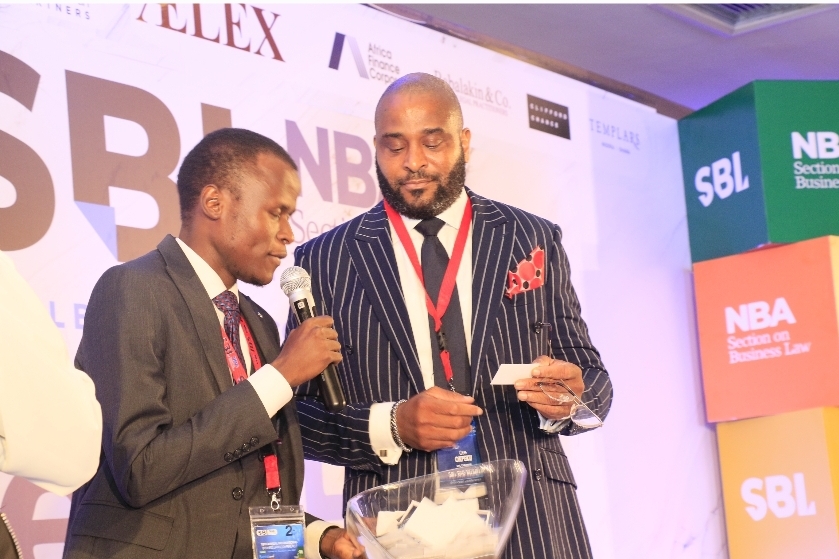
Breakout Session 5: Unlocking the Potential of Real Estate Investment Trusts in Nigeria
Moderated by Mr. Ismaila Usman, this session delved into the opportunities and challenges in Nigeria’s real estate investment trust sector. Speakers included Hajiya Saadiya Aliyu Aminu, Mr. Ezekiel Nya-Etok, Mr. Gbenga Ismail, and Hajiya Sa’adatu Aliyu.
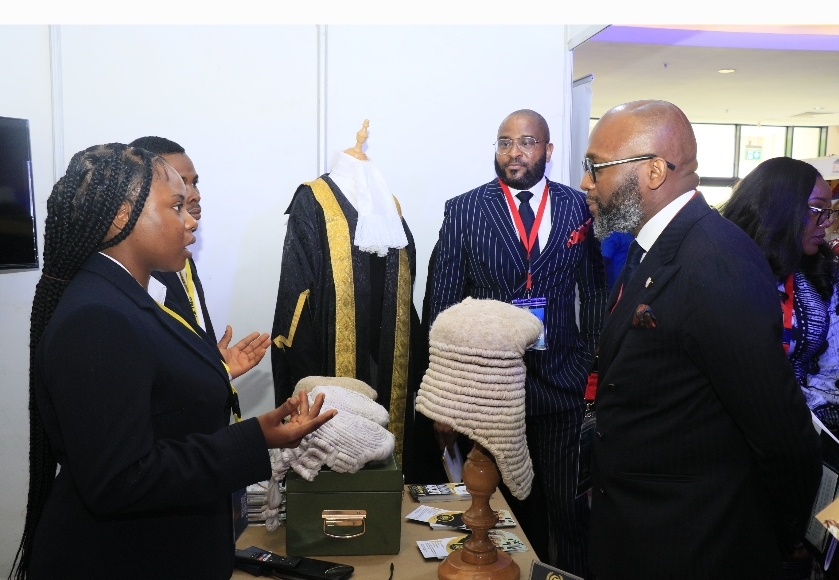
Breakout Session 6: The Untapped Potential of the Blue Economy
Moderated by Ms. Kashimana Tsumba, this session explored the blue economy’s potential in Nigeria and how it will help the governments create huge opportunities which in turn will create new sources of revenue that may contribute to the implementation of development plans and reduce donor dependency on national budgets. It featured insights from Dr. Emeka Akagbogu, Mr. Olanrewaju Badmus, Ms. Boma Alabi, OON, SAN, Ms. Joy Asanga-Dimka, and Mr. Jibril Abba.
Following the breakout sessions was Plenary Five: Session with Past NBA-SBL Chairs. Moderated by Ms. Ozofu Ogiemudia vice chair NBA-SBL, the session reflected on the NBA-SBL’s past achievements and future directions. Mr. George Etomi, founding chairman of the SBL, reminisced about the organization’s inception and expressed joy at its growth.
He attributed the success of the SBL to hard work and dedication and commended the current chairman and planning committee for organizing an excellent conference. Mr. Adeoye Adefulu also shared his positive reflections on his SBL’s journey and encouraged young lawyers to engage actively, stating that the future of the SBL lies in their hands.
Next was Plenary Six: Mental Health – Moment of Truth: Are We Burning Out?
Moderated by Ms. Sylvia Nzekwu, this session addressed mental health and burning out in the legal profession, particularly in light of the current economic situation. Insights were provided by Mr. Omoruyi Edoigiawerie, Ms. Maimuna Ummi, Ms. Ayodele Adeyemi-Faboya, Ms. Tosin Ajose, Ms. Oyiza Salu, and Mr. Jamiu Akolade. The session encouraged attendees, especially young lawyers, to stay focused and resilient in their careers and to seek therapy if needed.
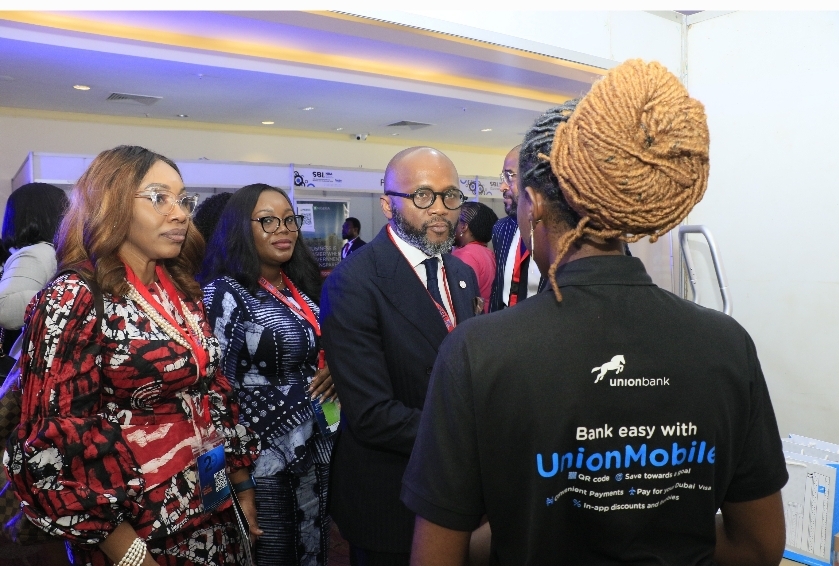
Following this were the conference debates. The day concluded with 2 lawyers winning the Tare Yeri Award and 1 winning the Oludamola Awobokun Recognition. The Tare Yeri Award was for dedication, selfless contribution and unwavering commitment towards the development of the NBA-SBL. While the Oludamola Awobokun Recognition was for embodying diligence, consistency, hard work, and efficiency in the NBA-SBL. Closing remarks and recognitions by the CPC Chair, Ose Okpeku and the NBA-SBL Chairman, Mr. Adeoye Adefulu, marked the official end of the conference. The conference ended on a high note in a lively celebration party for the NBA-SBL’s 20th anniversary.
The NBA-SBL remains committed to providing a platform for legal professionals to exchange knowledge and foster growth in the field of business law.
For further information and updates on the conference, visit the NBA-SBL website at www.nbasbl.org or contact the Conference Secretariat at info@nbasbl.org. Follow us on social media platforms to stay updated. Please visit NBA-SBL on Instagram – @nbasbl and Twitter – @nbasblofficial.

by Legalnaija | Jun 20, 2024 | Uncategorized

INTRODUCTION
In Nigeria, there are several laws and regulations that govern art transactions and art laws, such as the Sale of Goods Act, the Copyright Act, the National Gallery of Art Act, the Value Added Tax Act, the Customs and Excise Management Act, etc.
- CONSTITUTION OF THE FEDERAL REPUBLIC OF NIGERIA 1999 (as amended)
Section 21 of the constitution provides that the state shall protect, preserve and promote the Nigerian cultures, which enhance human dignity. It also provides that the state shall encourage development of technological and scientific studies which enhance cultural values.[1]
Section 44(1) of the constitution guarantees the right to own and acquire movable property in Nigeria. Thus a person has a right to purchase and own an art work in Nigeria.
- SALE OF GOODS ACT, 1893
Although artists create artworks to express their thoughts and emotions, selling these pieces is also a common practice. When an artist sells an artwork, a contract of sale sets out the terms and conditions of the transaction. This process involves various legal considerations governed by both general sales law and specialized art law. The Sales of Goods Act, 1893, is a key legislation regulating contracts of buying and selling in Nigeria. While it allows parties to set their own terms of agreement, it also provides certain implied terms to ensure fair and standard practices in sales contracts.
When artworks are bought and sold, the principles of the Sales of Goods Act often apply, but with specific considerations unique to art:
- Implied Terms and Quality: Determining whether an artwork meets implied terms can be complex due to issues of authenticity, condition, and provenance[2].
- Transfer of Property: Ownership and title transfer are critical, especially in ensuring there are no disputes over stolen art or unclear provenance[3].
- Warranties and Representations: Sellers often provide warranties about the authenticity and provenance of art, which can lead to significant legal issues if breached[4].
- Remedies: Buyers of art may seek rescission (cancellation) of the sale, damages, or other remedies if the artwork is found to be a forgery or misrepresented[5].
- COPYRIGHT ACT, 2022
The copyright Act is the major legislation that protects the rights of original creators and authors in Nigeria.
Section 1 of the act expressly states out the objectives of the Act to include;
- protect the rights of authors to ensure just rewards and recognition for their intellectual efforts ;
- provide appropriate limitations and exceptions to guarantee access to creative works ;
- facilitate Nigeria’s compliance with obligations arising from relevant international copyright treaties and conventions ; and
- enhance the capacity of the Nigerian Copyright Commission for effective regulation, administration, and enforcement of the provisions of this Act.
Section 2 of the Copyrights Act lists the categories of works eligible for Copyright in Nigeria. They include;
- literary works ;
- musical works ;
- artistic works ;
- audiovisual works ;
- sound recordings ; and
Section 10 of the Copyrights act provides that Subject to the exceptions specified in Part II of the Act, copyright in an artistic work shall be the exclusive right to do and authorise the doing of any of the following acts —
- reproduce the work ;
- publish the work ;
- include the work in an audiovisual work ;
- broadcast the work ;
- communicate the work to the public ;
- make the work available to the public by wire or wireless means in such a way that members of the public are able to access the work from a place and at a time individually chosen by them
- make any adaptation of the work and
- do in relation to an adaptation of the work any of the acts specified in relation to the work under subsection (1)(a), (b) and (c).
Section 14(1) (a) & (b) of the Copyright Act provides for the moral right of an artist. The author of a work in which copyright subsists has the right to claim authorship of his work, in particular that his authorship be indicated in connection with any of the acts referred to in sections 9, 10 and11of the Act, except when the work is incidentally or accidentally included in a broadcast when reporting current events. The author of a work also has the right to object and to seek relief in connection with any distortion, mutilation or other modification of, and any other derogatory action in relation to his work.
Section 17 of the act provides that, notwithstanding any assignment or sale of the original work, an author of an artistic work shall have an inalienable right to a share in the proceeds of any sale of that work by public auction or through a dealer, subsequent to the first transfer by the author. The right conferred by this section shall apply only to originals of such work. The condition for the exercise of the right conferred by this section shall be determined by regulations made by the Commission.
The duration for copyright in artistic works is provided in Section 19 of the act. Copyright in artistic works shall subsist until 70 years after the end of the year in which the author dies[6]. In the case of an anonymous artist, copyright shall subsist until 70 years after the year in which the work was first made available to the public with the consent of the author or 70 years after the work was created, if not made available to the public within that time, provided that when the author becomes known, known, the duration of copyright shall be in accordance with the provisions of subsection (1)[7].
Except as otherwise provided in an agreement, copyright conferred by this Act, shall initially vest in the author[8]. For the purpose of Chapter 4 of the Constitution of the Federal Republic of Nigeria 1999, copyright shall be deemed to be movable property and shall be transferable by way of assignment, testamentary disposition or operation of law[9].
Copyright is infringed by any person who without the authorisation of the owner of the copyright;
- does or causes any person to do an act, which constitutes a violation of the exclusive rights conferred under this Act ;
- imports or causes to be imported into Nigeria any copy of a work which if it had been made in Nigeria would be an infringing copy under this Act ;
- sells, offers for sale or hire any work in respect of which copyright is infringed under paragraph (a) ;
- makes or has in his possession, plates, master tapes, machines, equipment or contrivances used for the sole purpose of making infringing copies of the work ;
- permits a place of public entertainment or of business to be used for a public performance of the work, where the performance constitutes an infringement of copyright in the work, unless the person permitting the place to be used was not aware and had no reasonable ground to suspect that the performance constitutes an infringement of the copyright ;
- permits within its premises, the reproduction of a copyright work ; or
- performs or causes to be performed for the purposes of trade or business or the promotion of a trade or business, any work in which copyright subsists[10].
- THE VALUE ADDED TAX ACT
Value Added Tax (VAT) is a consumption tax levied on the value added to goods and services at each stage of production or distribution. The current rate of VAT in Nigeria is 7.5%.
The sale of artworks by artists, galleries, dealers, and auction houses is typically subject to VAT. Understanding VAT and its implications on the sale and purchase of artworks is crucial for both artists and buyers. It ensures compliance with tax laws and helps manage the financial aspects of art transactions effectively.
- CUSTOMS AND EXCISE MANAGEMENT ACT
In Nigeria, the Customs Act and Art Law intersect in several significant ways, particularly concerning the import and export of artworks. Understanding these legal frameworks is essential for artists, collectors, dealers, and cultural institutions engaged in international art transactions.
- NATIONAL COUNCIL FOR ARTS AND CULTURE ACT
This act establishes the National institute for Cultural Orientation with the objective of promoting and fostering the appreciation, revival and development of Nigerian Arts and Culture.
- THE NATIONAL ART GALLERY ACT
This Act establishes the National Gallery of Art, which is responsible for collecting, preserving, and promoting Nigerian visual arts. It also provides for the regulation of art exhibitions and the promotion of art education.
- TRADEMARKS ACT (CAP T13, LAWS OF THE FEDERATION OF NIGERIA 2004)
The Trademarks Act protects the intellectual property rights of artists and creators by allowing them to register trademarks for their works. This can include logos, symbols, and other distinctive marks used in commerce.
CONCLUSION
The legal framework of art law in Nigeria is multifaceted, involving various laws and institutions aimed at protecting and promising the heritage of art works as well as protecting the rights and interest of art stakeholders.
References
[1] Section 21, 1999 Constitution of the Federal Republic of Nigeria.
[2] Section 10, 12, 14 and 15 of the Sale of Goods act, 1893.
[3] Ibid at 2
[4] Section 12, Sale of Goods Act, 1893.
[5] Section 39, Sale of Goods Act, 1893..
[6] Section 19(1) Copyright Act, 2022
[7] Section 19 (2) Copyright Act, 2022
[8] Section 28, Copyright Act, 2022
[9] Section 30, Copyright Act, 2022
[10] Section 36, Copyright Act, 2022
Source: AOC SOLICITORS
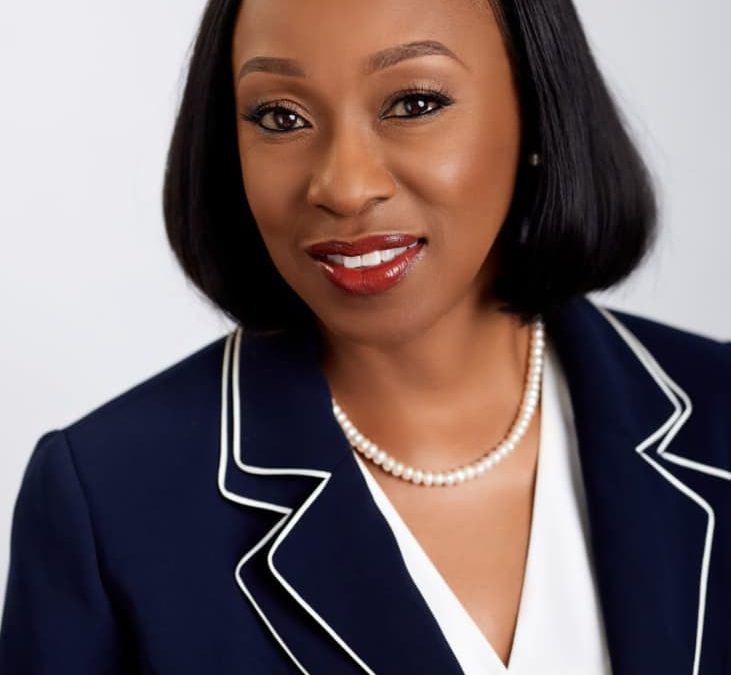
by Legalnaija | Jun 13, 2024 | Uncategorized
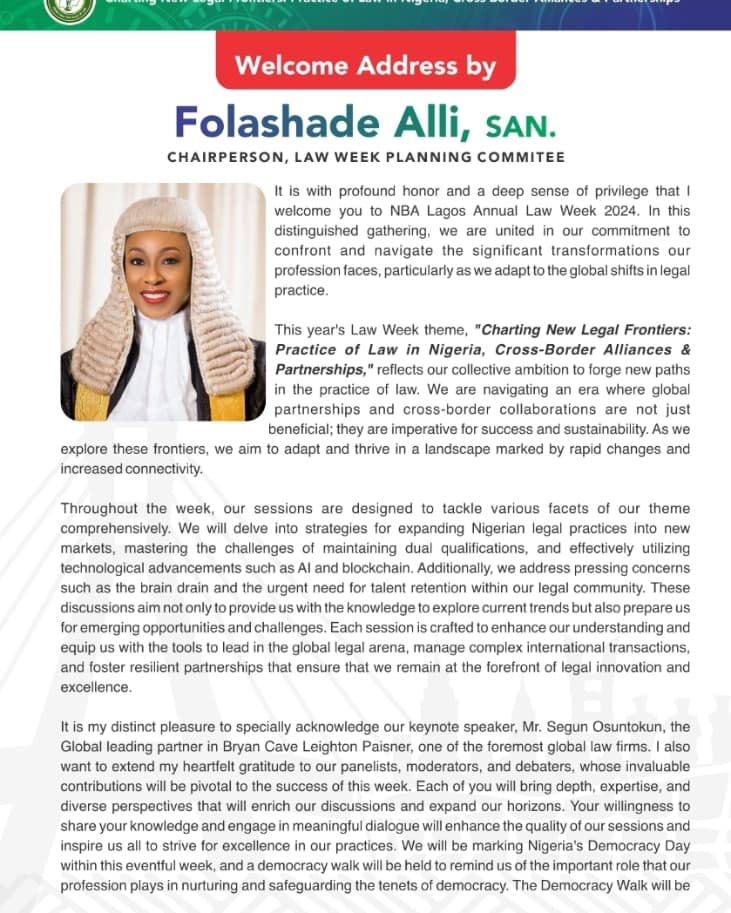
It is with profound honor and a deep sense of privilege that I welcome you to NBA Lagos Annual Law Week 2024. In this distinguished gathering, we are united in our commitment to confront and navigate the significant transformations our profession faces, particularly as we adapt to the global shifts in legal practice.
This year’s Law Week theme, “Charting New Legal Frontiers: Practice of Law in Nigeria, Cross-Border Alliances & Partnerships,” reflects our collective ambition to forge new paths in the practice of law. We are navigating an era where global partnerships and cross-border collaborations are not just beneficial; they are imperative for success and sustainability. As we explore these frontiers, we aim to adapt and thrive in a landscape marked by rapid changes and increased connectivity.
Throughout the week, our sessions are designed to tackle various facets of our theme comprehensively. We will delve into strategies for expanding Nigerian legal practices into new markets, mastering the challenges of maintaining dual qualifications, and effectively utilizing technological advancements such as AI and blockchain. Additionally, we address pressing concerns such as the brain drain and the urgent need for talent retention within our legal community. These discussions aim not only to provide us with the knowledge to explore current trends but also prepare us for emerging opportunities and challenges. Each session is crafted to enhance our understanding and equip us with the tools to lead in the global legal arena, manage complex international transactions, and foster resilient partnerships that ensure that we remain at the forefront of legal innovation and excellence.
It is my distinct pleasure to specially acknowledge our keynote speaker, Mr. Segun Osuntokun, the Global leading partner in Bryan Cave Leighton Paisner, one of the foremost global law firms.
I also want to extend my heartfelt gratitude to our panelists, moderators, and debaters, whose invaluable contributions will be pivotal to the success of this week. Each of you will bring depth, expertise, and diverse perspectives that will enrich our discussions and expand our horizons. Your willingness to share your knowledge and engage in meaningful dialogue will enhance the quality of our sessions and inspire us all to strive for excellence in our practices.
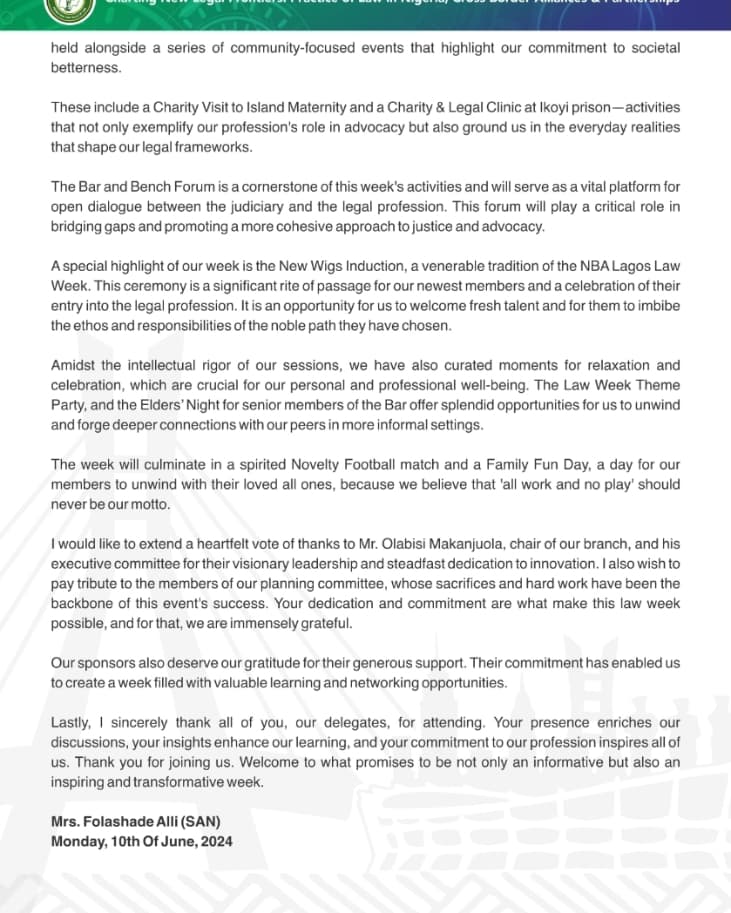
We will be marking Nigeria’s Democracy Day within this eventful week, and a democracy walk will be held to remind us of the important role that our profession plays in nurturing and safeguarding the tenets of democracy. The Democracy Walk will be held alongside a series of community-focused events that highlight our commitment to societal betterness. These include a Charity Visit to Island Maternity and a Charity & Legal Clinic at Ikoyi prison—activities that not only exemplify our profession’s role in advocacy but also ground us in the everyday realities that shape our legal frameworks.
The Bar and Bench Forum is a cornerstone of this week’s activities and will serve as a vital platform for open dialogue between the judiciary and the legal profession. This forum will play a critical role in bridging gaps and promoting a more cohesive approach to justice and advocacy.
A special highlight of our week is the New Wigs Induction, a venerable tradition of the NBA Lagos Law Week. This ceremony is a significant rite of passage for our newest members and a celebration of their entry into the legal profession. It is an opportunity for us to welcome fresh talent and for them to imbibe the ethos and responsibilities of the noble path they have chosen.
Amidst the intellectual rigor of our sessions, we have also curated moments for relaxation and celebration, which are crucial for our personal and professional well-being. The Honourable Chief Judge’s Cocktail, the Red Carpet Law Week Theme Party, and the Elders’ Night for senior members of the Bar offer splendid opportunities for us to unwind and forge deeper connections with our peers in more informal settings.
The week will culminate in a spirited Novelty Football match and a Family Fun Day, a day for our members to unwind with their loved all ones, because we believe that ‘all work and no play’ should never be our motto.
I would like to extend a heartfelt vote of thanks to Mr. Olabisi Makanjuola, chair of our branch, and his executive committee for their visionary leadership and steadfast dedication to innovation. I also wish to pay tribute to the members of our planning committee, whose sacrifices and hard work have been the backbone of this event’s success. Your dedication and commitment are what make this law week possible, and for that, we are immensely grateful.
Our sponsors also deserve our gratitude for their generous support. Their commitment has enabled us to create a week filled with valuable learning and networking opportunities.
Lastly, I sincerely thank all of you, our delegates, for attending. Your presence enriches our discussions, your insights enhance our learning, and your commitment to our profession inspires all of us.
Thank you for joining us. Welcome to what promises to be not only an informative but also an inspiring and transformative week.
Mrs. Folashade Alli (SAN)
Monday, 10th Of June, 2024
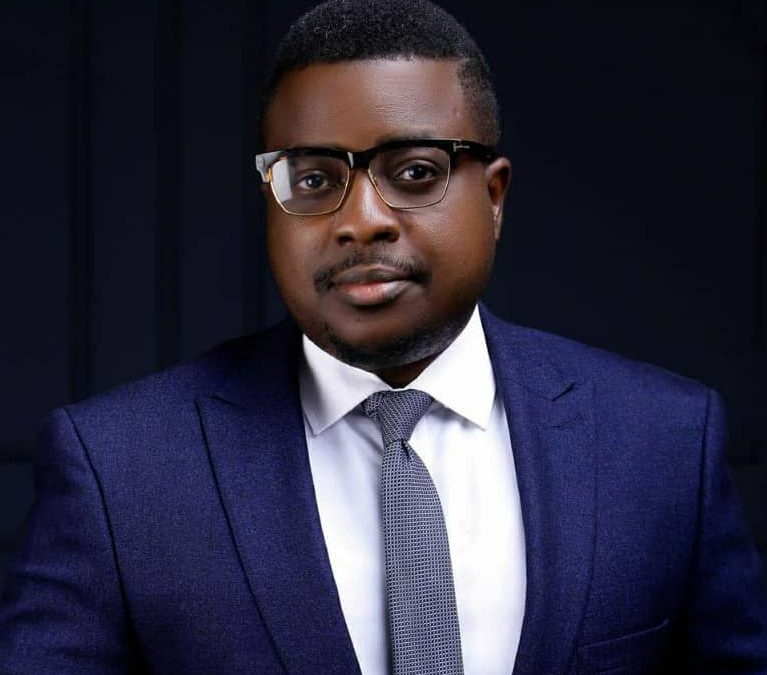
by Legalnaija | Jun 10, 2024 | Uncategorized
Overview:
In the case of Tolulope Aderemi v. Kenya Airways LTD, the Honourable Court addressed a passenger’s claim against Kenya Airways Ltd. for a significant flight delay. The plaintiff, Mr. Tolulope Aderemi, sought compensation for the inconvenience and untold hardship he incurred due to the wanton delay of flight KQ535D from Lagos, Nigeria to London through Nairobi initially scheduled for Saturday, 3rd of August, 2019. The Court held that the Defendant’s summary cancellation, wanton delay of journey and inexplicable failure to communicate the rescheduling amounted to negligence. Also that the Defendant’s failure to notify the Claimant of the flight cancaellation amounted to a breach of contract by air. The Court also awarded the sum of $5,180 to the Claimant.
Facts
Mr. Tolulope Aderemi was scheduled to fly from Lagos, Nigeria to London through Nairobi on Saturday, the 3rd of August, 2019. The flight, operated by Kenya Airways LTD, was delayed to Sunday, the 4th of August, 2019. Mr. Tolulope Aderemi claimed that the failure of the airline to provide prompt and adequate communication of the delay amounted to negligence and also occasioned untold hardship and inconvenience to him.
Mr. Tolulope Aderemi instituted an action before the Honourable Justice Faji, sitting at the Federal High Court, Ikoyi, Lagos, seeking compensation under the Montreal Convention and the Nigerian Civil and Aviation Act, which governs international air travel and provides for passenger rights in cases of delays, cancellations, and other disruptions. Upon hearing the arguments of parties, the Honourable Court dismissed reliefs number 4 and 5 claimed by the Plaintiff and in the same vein, awarded the sum of $5,180.00 (Five Thousand One Hundred and Eighty Dollars) in favour of the Plaintiff.
Reliefs claimed by the Plaintiff
The reliefs clamed against the Defendant were as follows;
- A DECLARATION that the summary flight cancellation, wanton delay of journey, inexplicable failure of the Defendant to promptly communicate the rescheduling of flight KQ535D from Saturday, the 3rd of August 2019, to Sunday, the 4th of August, 2019; the flight from Lagos, Nigeria to London through Nairobi amounts to negligence.
- A DECLARATION that the failure of the Defendant to notify the Plaintiff and his agent of the alleged cancellation/rescheduling of flight KQ535D from Saturday, the 3rd of August, 2019, to Sunday, the 4th of August, 2019 amounts to breach of contract by air.
- A DECLARATION that the Defendant was negligent in handling the summary flight cancellation, wanton delay of journey and failure to notify the Plaintiff of the rescheduling of flight KQ535D from Saturday, the 3rd of August 2019, to Sunday, the 4th of August, 2019.
- A DECLARATION that the Defendant’s failure to airlift the Plaintiff’s passenger luggage on the return flight from London to Nairobi with the attendant inconvenience and untold hardship foisted on the Plaintiff amounts to negligence.
- A DECLARATION that the Defendant’s failure to airlift the Plaintiff’s passenger luggage on the return flight from London to Nairobi with the attendant inconvenience and untold hardship foisted on the Plaintiff amounts to breach of contract of carriage by air.
- The sum of $5,180.00 (Five Thousand One Hundred and Eighty Dollars) representing the Defendant’s liability under the Montreal Convention for the delay in airlifting the Plaintiff and rescheduling of flight KQ535D from Saturday, the 3rd of August 2019, to Sunday, the 4th of August, 2019.
- General damages in the sum of N50,000,000 (Fifty Million Naira) being compensation for anguish , psychological trauma and mental distress occasioned by the summary cancellation and or rescheduling of Flight KQ535D from Saturday, the 3rd of August 2019, to Sunday, the 4th of August, 2019 and subsequent delay/failure to airlift the Plaintiff’s Passenger luggage on the return flight from London to Nairobi.
Rationale of the Court
The Honourable court after considering the arguments of both parties formulated two issues for legal determination to wit;
- Whether in view of the state of the parties’ pleadings, the evidence led and all surrounding facts and circumstances of this case, the Plaintiff has made out a case of Breach of contract of carriage by air and willful misconduct?
- If issue 1 is answered in the affirmative, whether the Plaintiff is entitled to the reliefs sought?
The court went further stating that the Plaintiff’s claim is two-fold to wit;
- Cancelation/delay of his flight from Lagos to Nairobi
- Delay in delivering his checked-in luggage on his return from London through Nairobi to Lagos.
The Honourable court in addressing the issues of parties, rightly identified thus;
“I think it is fairly common ground that the instant suit involves an International Carriage by Air (Colonies, Protectorate & Trust Territories) Order, 1953 which became operational on the 1st of January, 1954.The MontrealConvention was ratified by Nigeria and domesticated by virtue of the Civil Aviation Act (CAA) of 2006. Even though there is a new Civil Aviation Act of No. 30 of 2022 which came into force on the 16th of August, 2022, the applicable law to this suit is CAA 2006 which was the law in force when the cause of action arose in 2019.”
In view of the provisions of Article 19 of the Montreal Convention the court stated that there is no liability if the carrier can show that it took all measures that could reasonably be required to avoid the damage or that it was impossible for it to take said measures.
In light of the above, the court identified that Kenya Airways Ltd gave no explanation whatsoever for the delay. In the wordings of the court;
“There is no evidence of steps taken by the carrier to avoid the delay. There is no reference whatsoever to the reasons for the delay a fortiori an explanation of same or an indication of steps taken by the carrier to prevent the delay. It is also not in dispute that the carrier has a duty to notify the passenger in the event of a delay in flight. Much has been said about this.”
This ultimately led the court to find the Defendant’s conduct to be willful and consequently deprives it of the limitation protection in article 22 (1) (2) of the Montreal Convention. In a similar vein, the Honourable court opined thus;
“I find the totality of the of the defendant’s conduct on this score to be willful. It therefore seems to me that the conduct of the defendant herein deprives it of the limitation protection in Article 22 of the Montreal Convention and at the same time falls squarely within Article 22 (5) of the Montreal Convention as the failure to communicate the delay and the attendant failure to explain the delay on the particular day was done with intent to cause damage”
So in essence, the failure of the Defendant to communicate the delay, explain the delay and show the necessary steps it took to prevent said delay, would lead the court to invariably construe that said delay was done with intent to cause damage. In the wordings of the Honourable Court;
“In the instant case, the combination of the failure to notify the Plaintiff or his agent of the delay in the flight as well as the failure to explain why the delay and the steps taken to prevent same from happening show a willfulness on the part of the defendant to cause damage to the Plaintiff.”
The rationale of the court as pointed out in the above is particularly instructive as in the instant case, the Plaintiff claimed an amount in line with the limitation clause in Article 22 of the Montreal Convention. It goes without saying that Mr. Tolulope Aderemi would have been entitled to more than the $5,180.00 (Five Thousand One Hundred and Eighty Dollars) he claimed. According to the Honourable court, “the Plaintiff however claims a sum which he contends is the limitation figure. I cannot therefore give more than the plaintiff has claimed.”
With regards to the second half of the Plaintiffs claim, the Honourable court in identifying whether there was indeed a delay in delivering the plaintiff’s checked-in luggage, stated that the answer to said question is contained in Article 17(3) Montreal Convention.
Said Convention provides;
If the carrier admits the loss of a checked baggage or if the checked baggage has not arrived at the expiration of the twenty-one days after the date which it ought to have arrived, the passenger is entitled to enforce against the carrier the rights which flow from the contract of carriage.
The court interpreting the above provision stated that;
“It is not in issue that the checked in luggage arrived within 21 days of the date it was supposed to arrive. It is only if it does not so arrive that the passenger is entitled to enforce the provisions of the Montreal Convention on delay in delivering the checked-in luggage.”
Following the above, the court held that the claim for delay in delivery of Plaintiffs checked in luggage is not actionable as the luggage was delivered per the requirements of the law.
Implications
This judgment undoubtedly underscores the obligations of airlines under the Montreal Convention, particularly regarding delayed flights. The court’s decision has several implications which include:
- Liability for Delays: The Honourable court’s decision makes clear that airlines cannot evade liability for delays caused to passengers without showing that it took reasonable measures to prevent said delay.The decision of the court also emphasizes the airline’s duty of care towards its passengers.
In the wordings of the Honourable court;
“the defendant did not only breach the contract of carriage to carry the Plaintiff on the 3rd of August 2019 but also took no measures to prevent the delay or at best failed to show what steps it took to avoid the delay. It also failed to notify the plaintiff of the change in advance of the flight. That seems to be negligence. That is also akin to willful misconduct, a term which must be view of the peculiar circumstances of the case. In the instant case, the combination of the failure to notify the Plaintiff or his agent of the delay in the flight as well as the failure to explain why the delay and the steps taken to prevent same from happening show a willfulness on the part of the defendant to cause damage to the Plaintiff.”
The foregoing implies that when an airline is unable to discharge its burden of proof and show that it not only notified the passenger of the impending delay but that it also took certain steps to avoid the delay. The court would infer awillfulnesson the part of the airline to cause damage to the passenger.
Such inference implies that the airline would be unable to plead the limitation clause contained in Article 22(1)(2) of the Montreal Convention and would rather be liable under the provisions of Article 25 of the Montreal Convention.
- Passenger Rights: The judgment also reinforces passengers’ rights to seek compensation for significant delays, particularly when airlines fail to fulfill their duty of care. This includes the right to receive timely information, assistance, and compensation for damages and any inconvenience.
- Obligations of airlines: The judgment illustrates the obligations of airlines under the Aviation laws to provide adequate care and communication during delays. This case serves as a precedent, encouraging airlines to adopt more robust contingency plans and ensure compliance with passenger rights regulations.
- A party cannot benefit from its wrongdoing: The Honourable court in the instant case also reaffirms the equitable principle of Ex turpi causa non oritur actio. In the wordings of the Honourable court, “It seems strange to me that a party would rely on the inadequacy of its system in justifying its wrongdoing.”
- Double compensation: the refusal of the Honourable court in the instant suit to award both claims of $5,180.00 (Five Thousand One Hundred and Eighty Dollars) and N50,000,000 (Fifty Million Naira) by the Plaintiff, reaffirms the rule against double compensation as succinctly held in the case of British Airways v. Atoyebi (2014) LPELR-23120(SC).
Conclusion:
The instant suit is a pivotal case reinforcing the protections afforded to passengers under the Montreal Convention. The judgment serves as a reminder to airlines of their obligations to notify passengers of delays and take such steps to avoid such delays. As flight delays and disruptions remain a common issue in air travel in Nigeria, this case may influence future litigation and encourage airlines to adopt a more passenger-friendly approach.
The decision of the court in favor of the Plaintiff sets a meaningful precedent, ensuring that passengers have recourse and that airlines in Nigeria are held accountable for service failures. This decision will likely prompt airlines to review and enhance their contingency plans and communication strategies to avoid similar liabilities in the future.

by Legalnaija | Jun 5, 2024 | Uncategorized
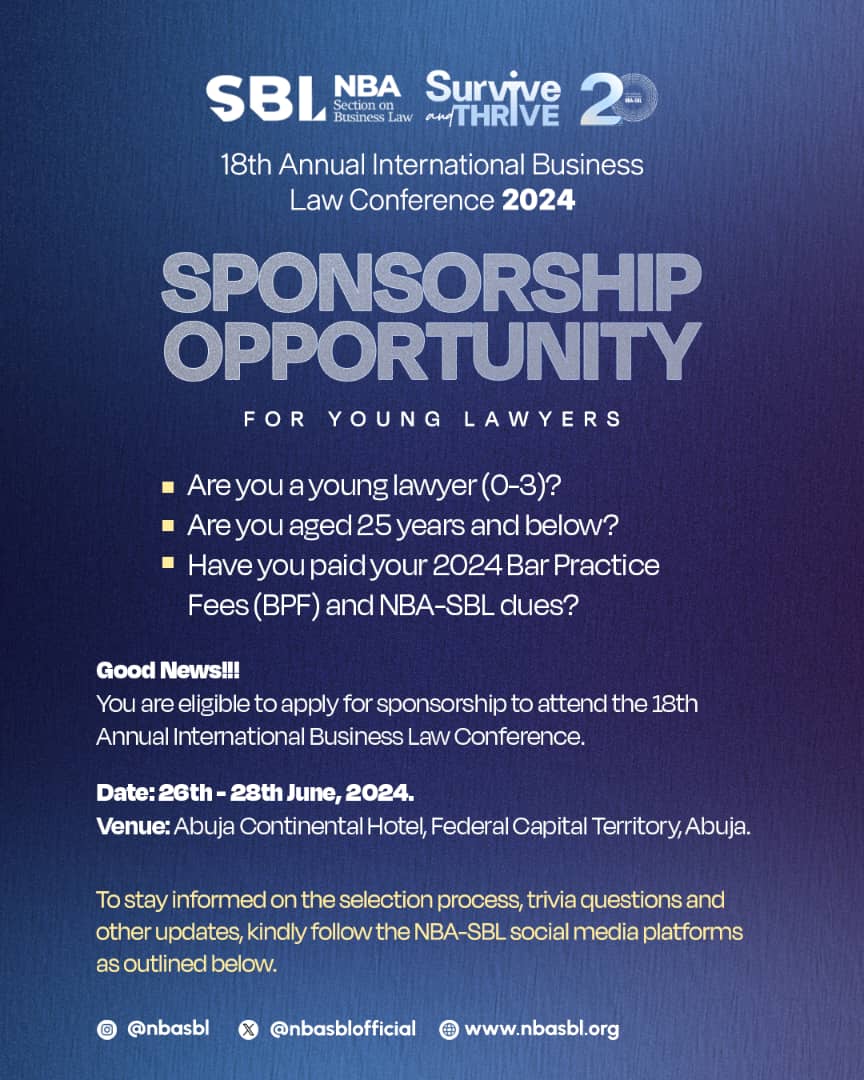
The Nigerian Bar Association, Section on Business Law (NBA-SBL), is pleased to announce sponsorship opportunities for young lawyers to attend this year’s Annual International Business Law Conference. Following the success of last year’s initiative, NBA-SBL is once again offering this sponsorship opportunity to support the professional development of young legal practitioners and provide them with access to valuable learning and networking opportunities.
Eligibility Criteria:
- You must be a young lawyer with 0-3 years of post-call experience
- You must not be more than 25 years of age
- You must have paid your 2024 Bar Practicing Fees (BPF) and NBA-SBL dues
If you meet the above criteria, you are eligible to apply for sponsorship to attend this year’s Annual Conference, scheduled to take place from June 26th to 28th, 2024, at the Abuja Continental Hotel, Federal Capital Territory, Lagos.
“We are excited to bring back this sponsorship opportunity for young lawyers,” said Ose Okpeku, Chairman of the NBA-SBL Conference Planning Committee. “It is part of our commitment to support the next generation of legal professionals and provide them with access to resources that will contribute to their professional growth and success.”
To stay informed about the selection process, trivia questions, and other updates regarding the sponsorship opportunity, kindly follow the NBA-SBL on social media platforms:
– Twitter: @nbasblofficial
– Instagram: – @nbasbl
Interested candidates are advised to keep an eye on these platforms for further information on how to apply for sponsorship and stay updated on conference-related news and announcements.
For more information about the conference, sponsorship opportunities, and registration details, please visit https://conference.nbasbl.org. Please visit the NBA-SBL website at www.nbasbl.org or contact the Conference Secretariat at info@nbasbl.org for additional information.
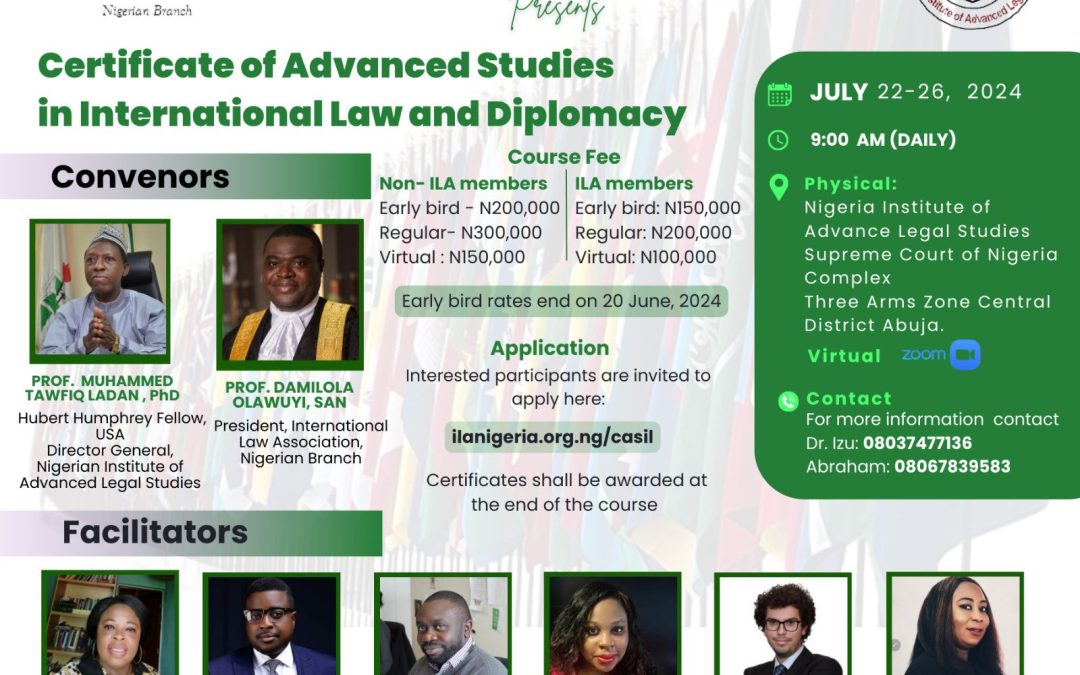
by Legalnaija | May 27, 2024 | Uncategorized
The advanced certificate course in international law is co-organized by the Nigerian Institute for Advanced Legal Studies (NIALS) and the International Law Association (ILA).
Given the importance of international law to national development, it is essential for key stakeholders in government, private practice, academia, and students to understand key multilateral agreements that, through their effective implementation, can accelerate sustainable development, specifically on issues related to foreign direct investments, regional economic integration, human rights, peace and security, climate change and environmental protection, management of new technologies, and alternative dispute resolution, amongst others.
The ultimate objective of this course is to expose participants to the specialised knowledge and skillsets required in the practice of international law and diplomacy. The course provides an in-depth examination of the core sources and principles of international law, the practical challenges that limit their effective design and implementation, especially in the context of developing economies, as well as the innovative approaches and skillsets required to negotiate win-win international instruments in an increasingly globalized world. The course will also address hot topics and trends that are particularly important for Nigeria, including the transfer of technology, the role of public-private partnerships in key economic sectors, business and human rights, and corporate social responsibility.
The one-week course is composed of nine 4-hour sessions. The first eight sessions (Monday–Thursday) focus on the legal frameworks and hot topics in international law and the settlement of disputes. In the last session (Friday morning), participants will be divided into groups and assigned a hypothetical case in international law to negotiate. and discuss
Who should attend?
• Lawyers in private practice
• Legal academics
• Government officials
• Members of the judiciary
• Non-lawyer experts in commercial, industrial, and financial sectors
• Representatives of organizations such as shipping companies, chambers of commerce, and arbitration bodies
• Anyone Interested in International Law
Certificates shall be awarded at the end of the course.
To register follow this link https://lnkd.in/dNJaDptk
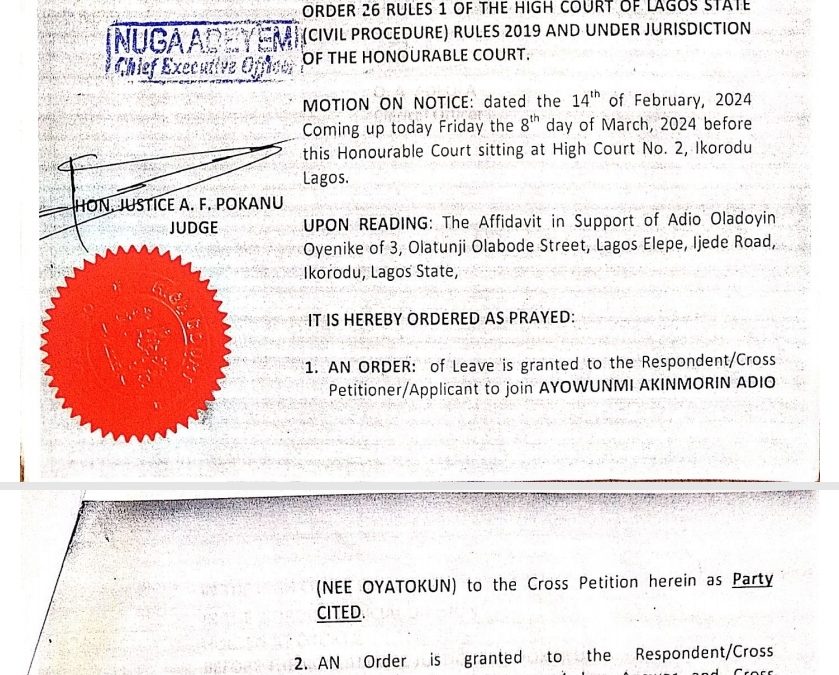
by Legalnaija | May 23, 2024 | Uncategorized
SUIT NO. IKD/10199HD/2022: ADIO vs. ADIO: ORDER FOR SUBSTITUTED SERVICE
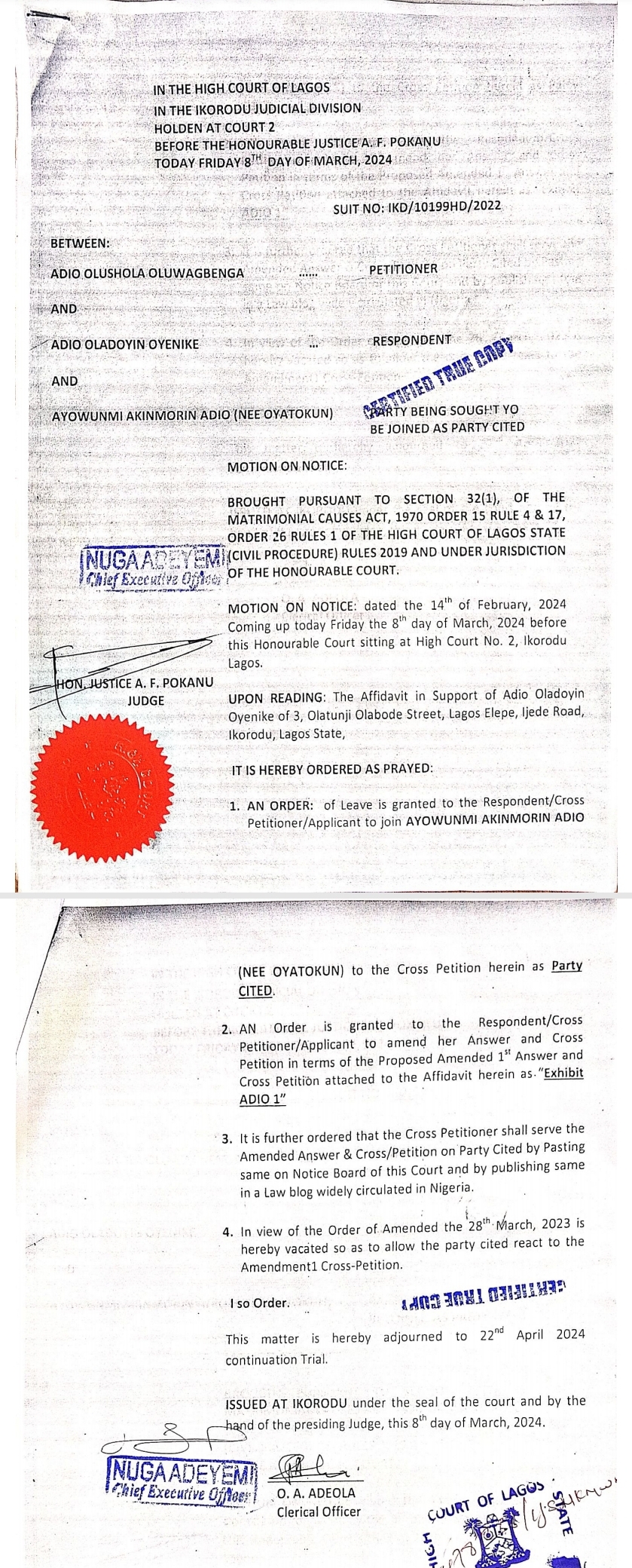
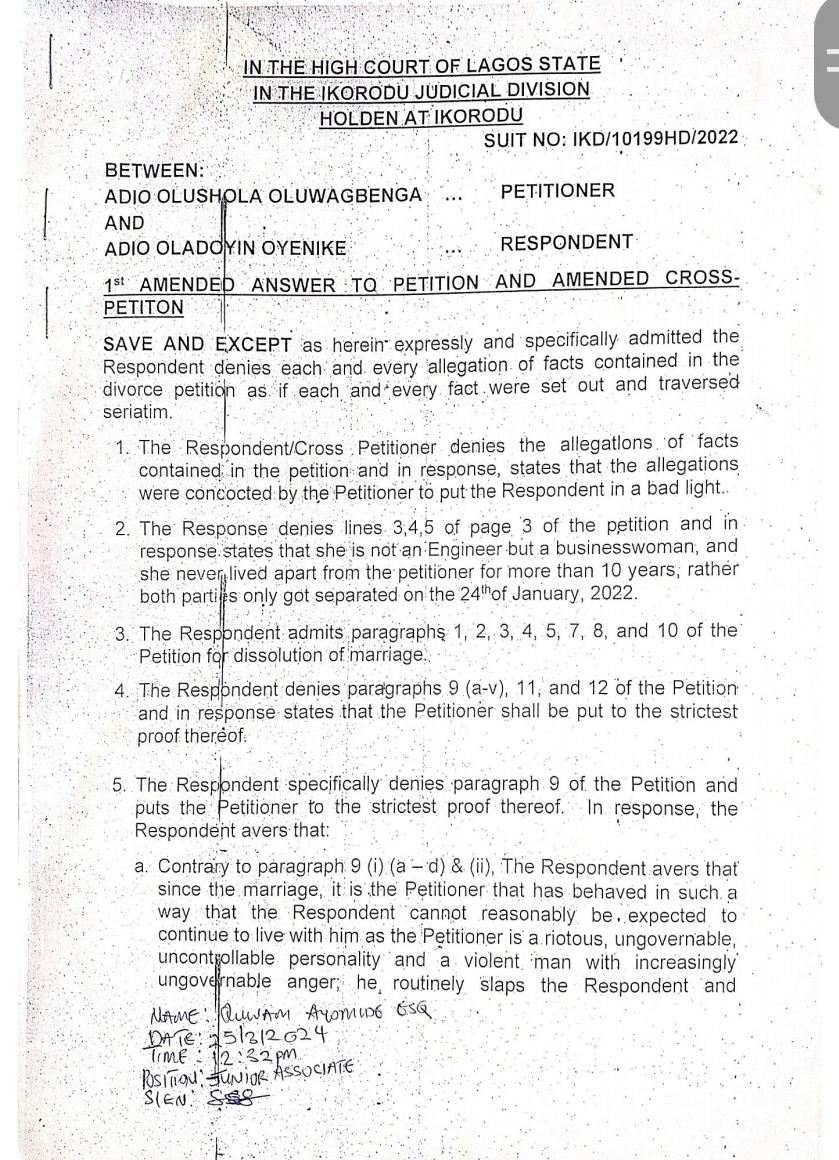
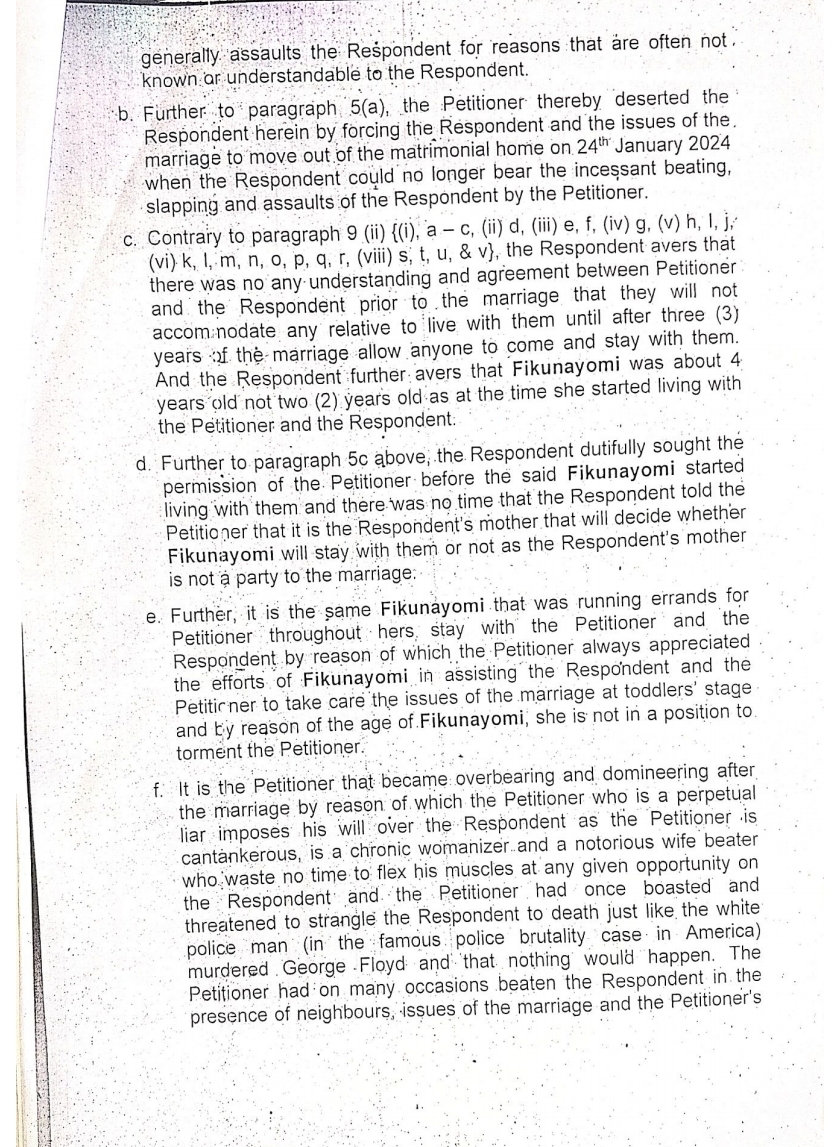
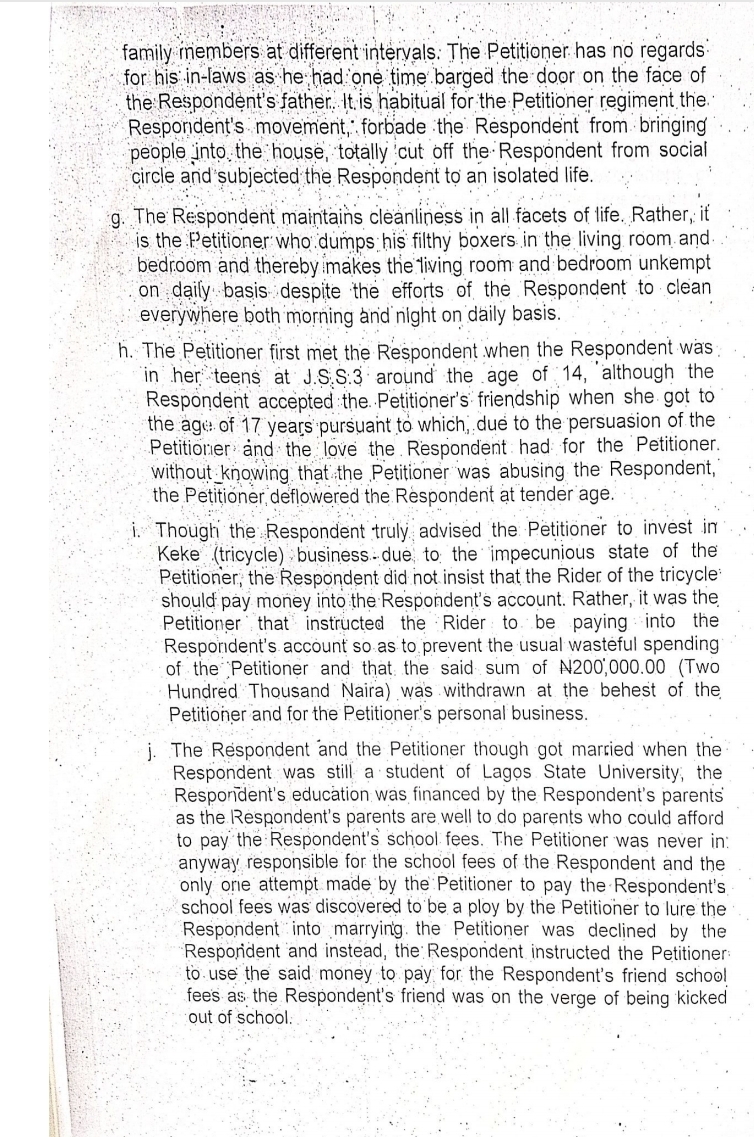
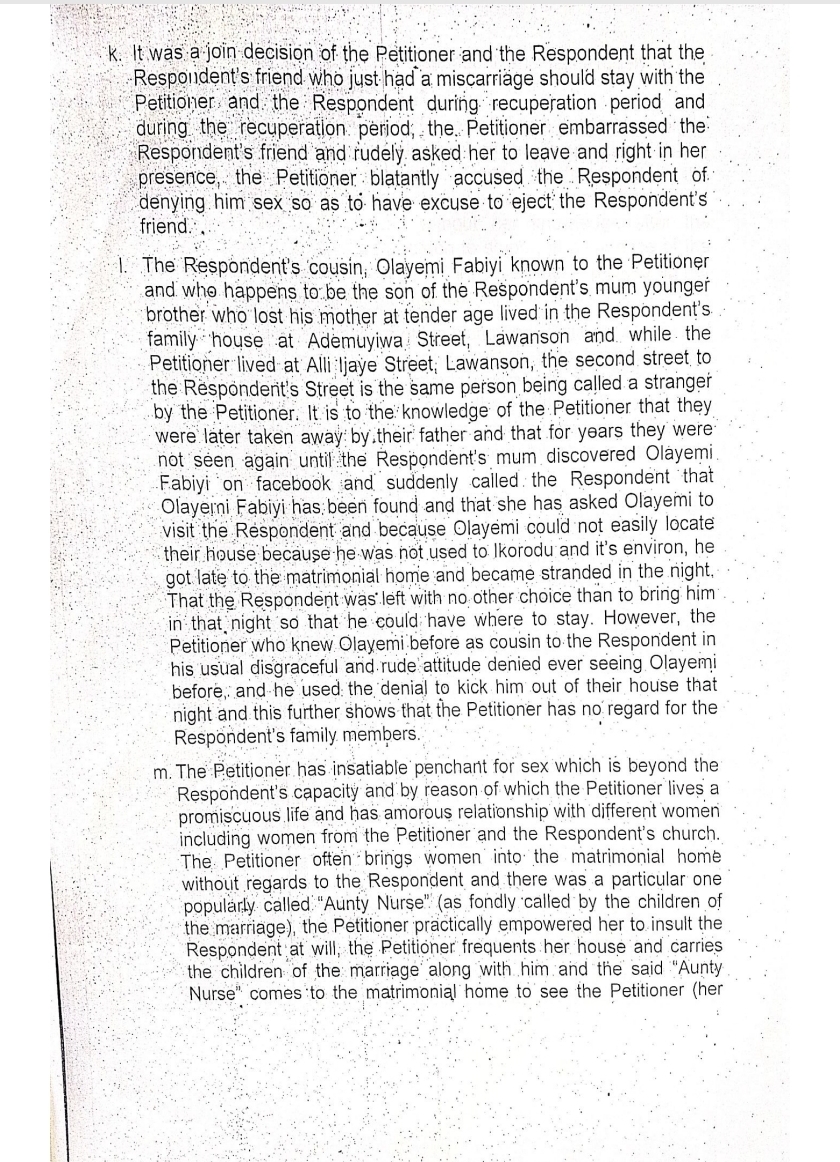
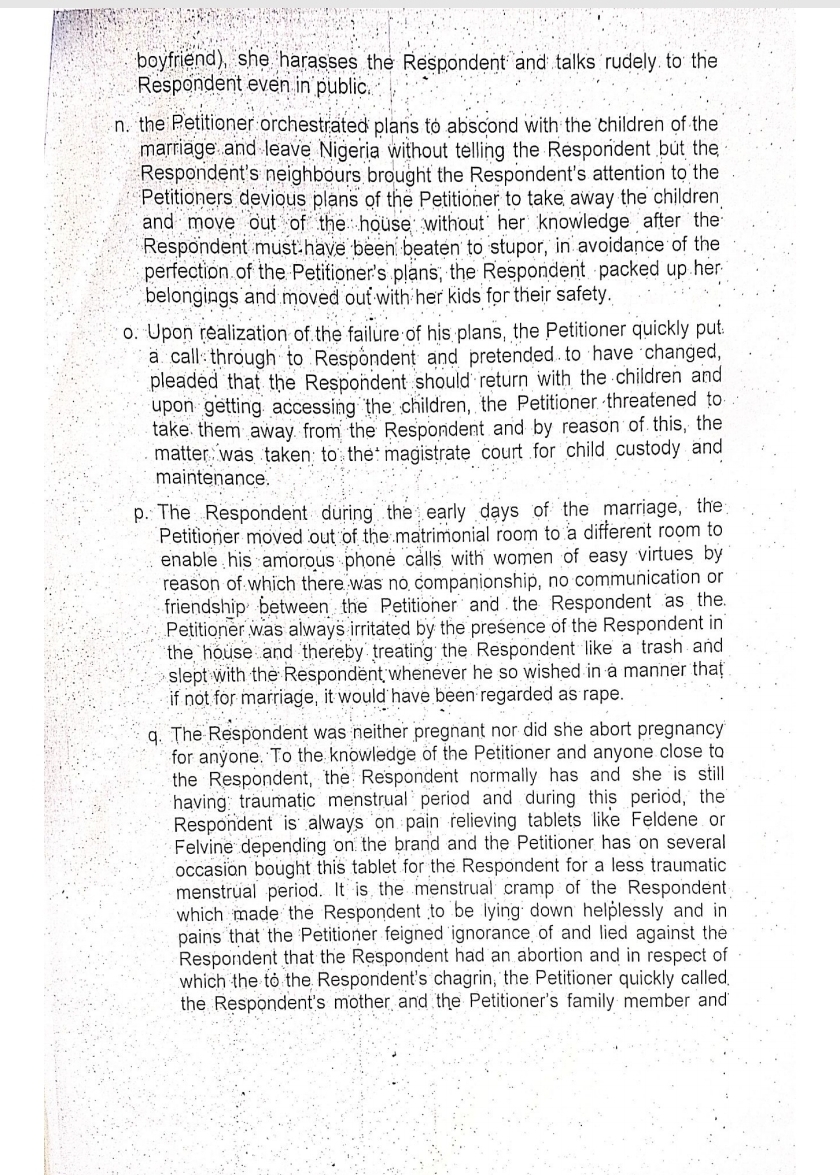
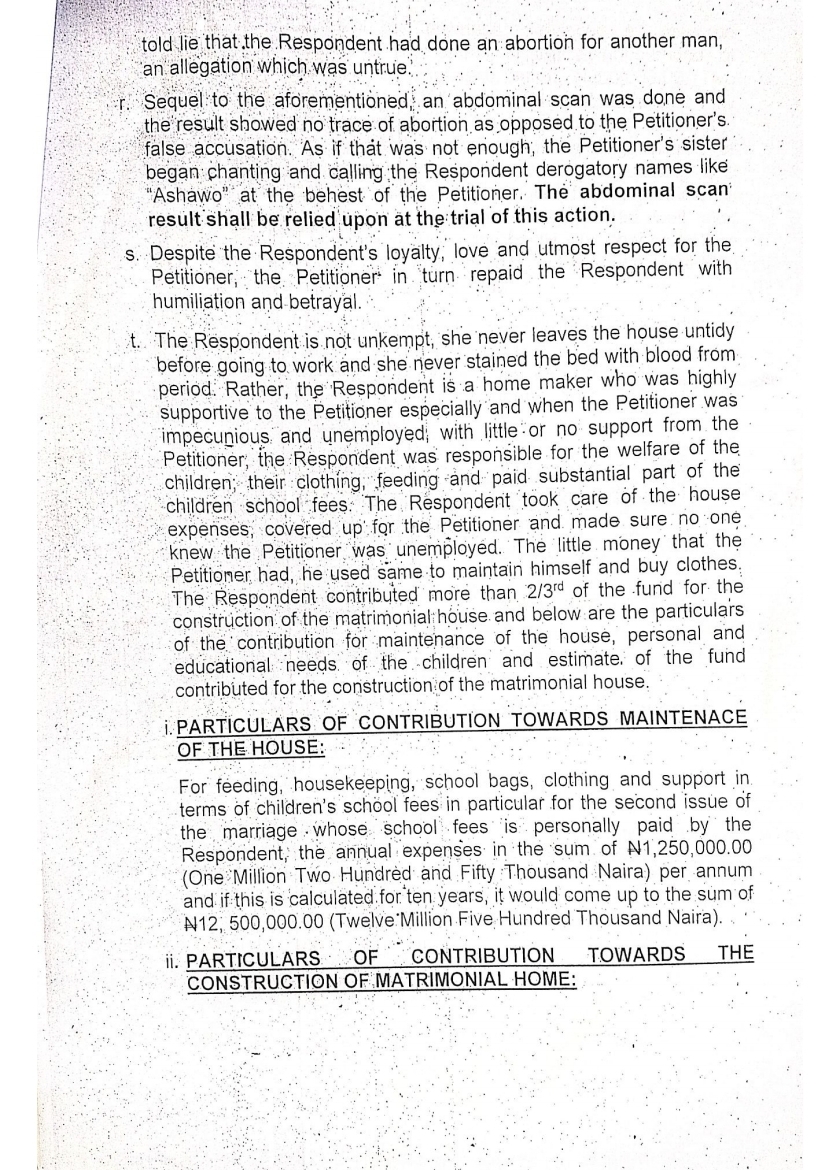
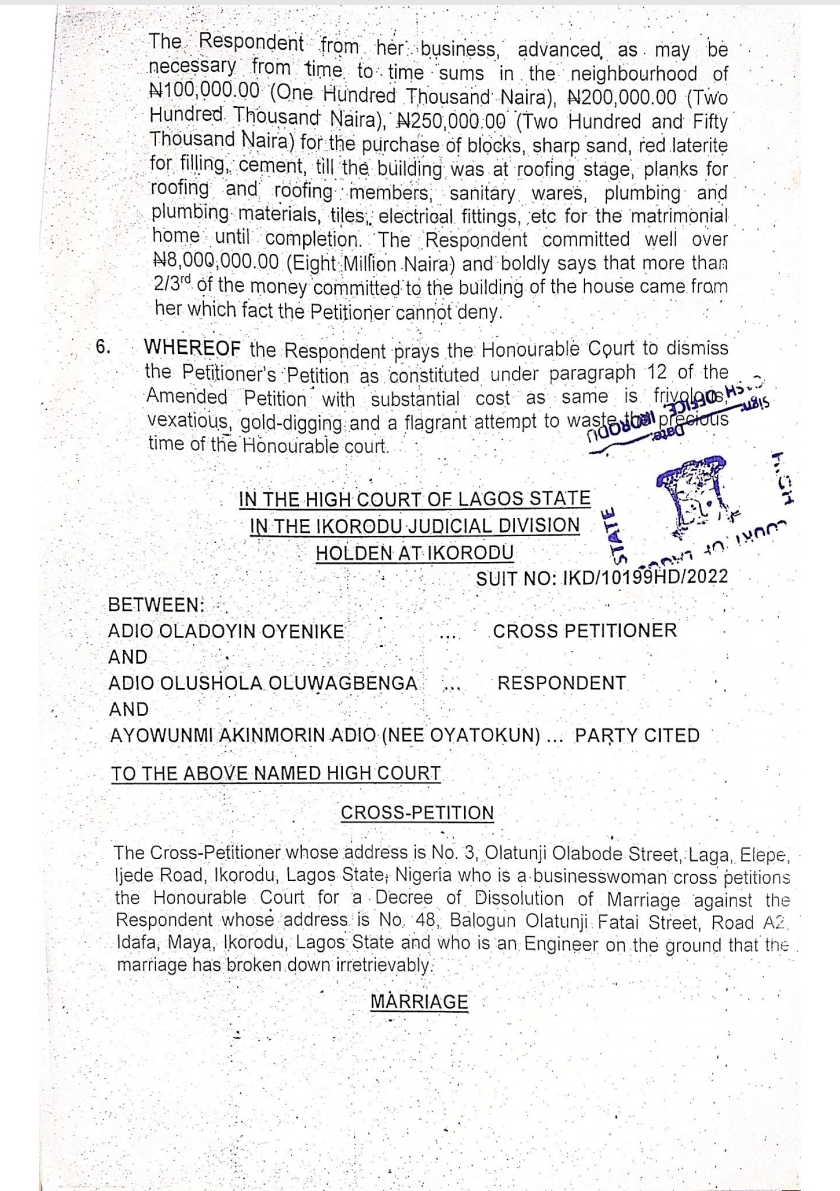
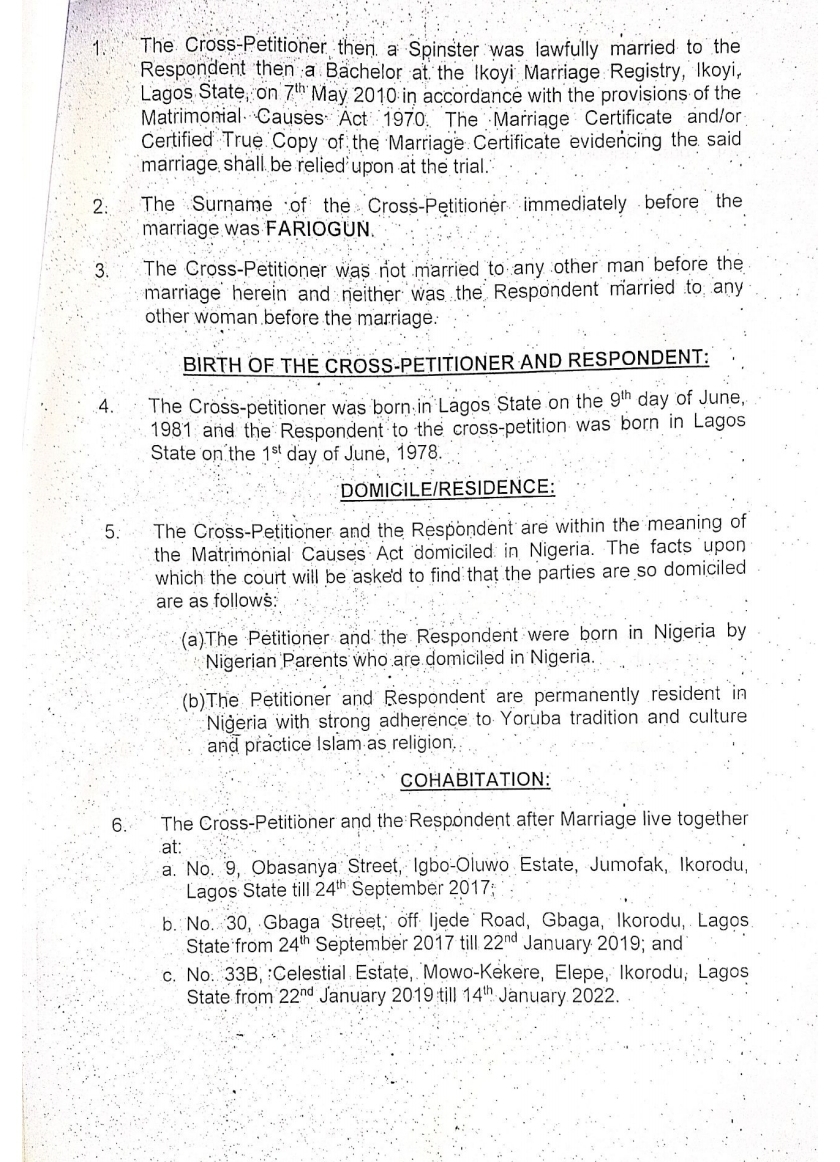
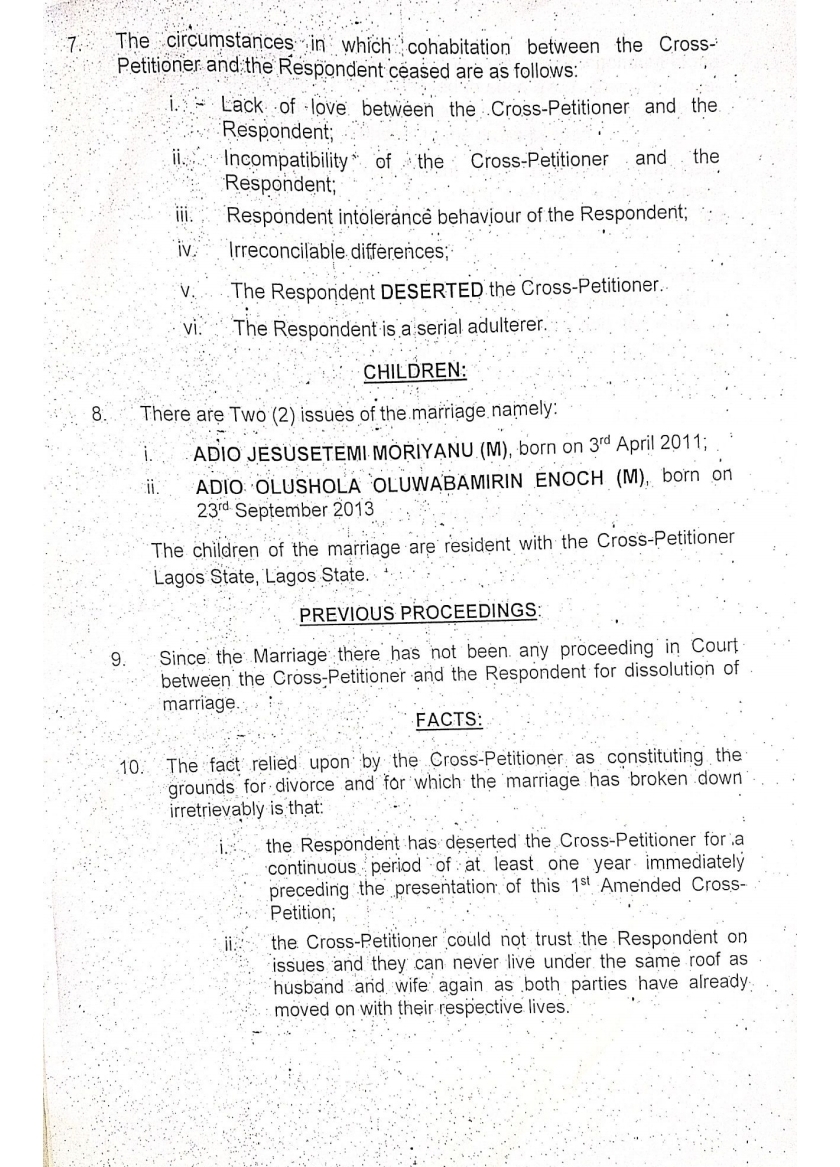
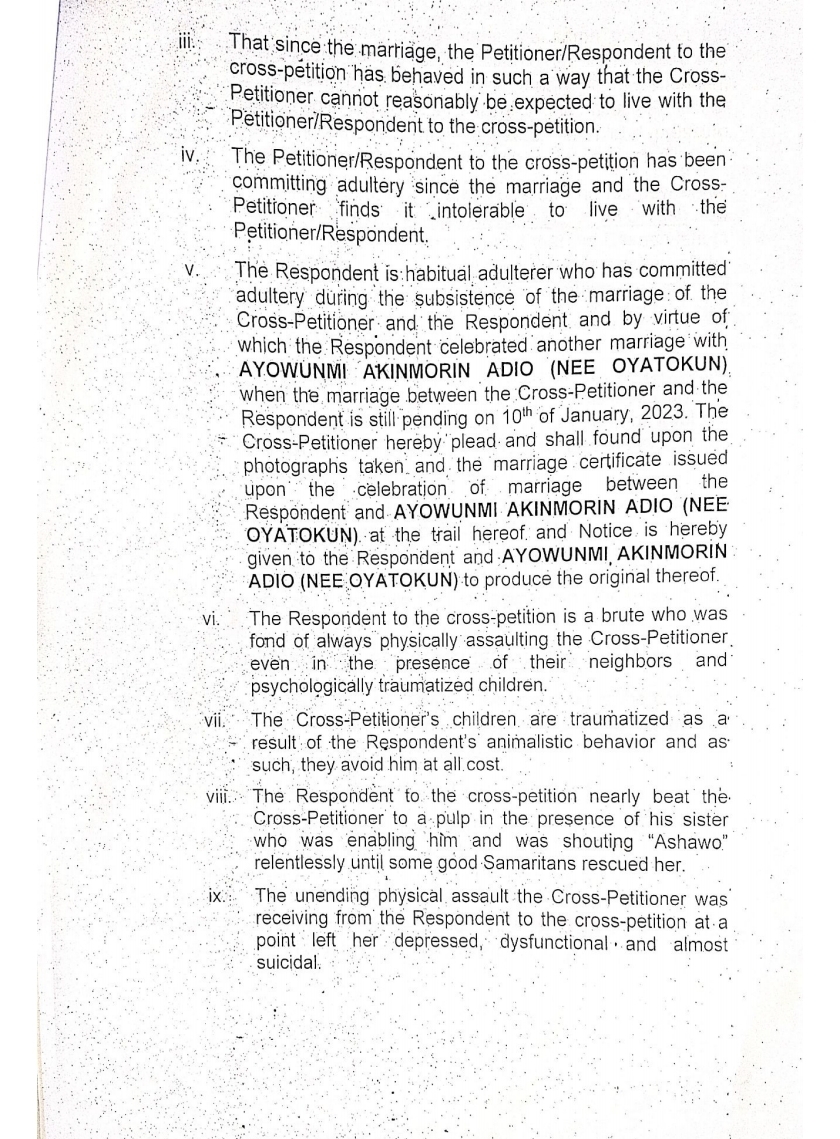
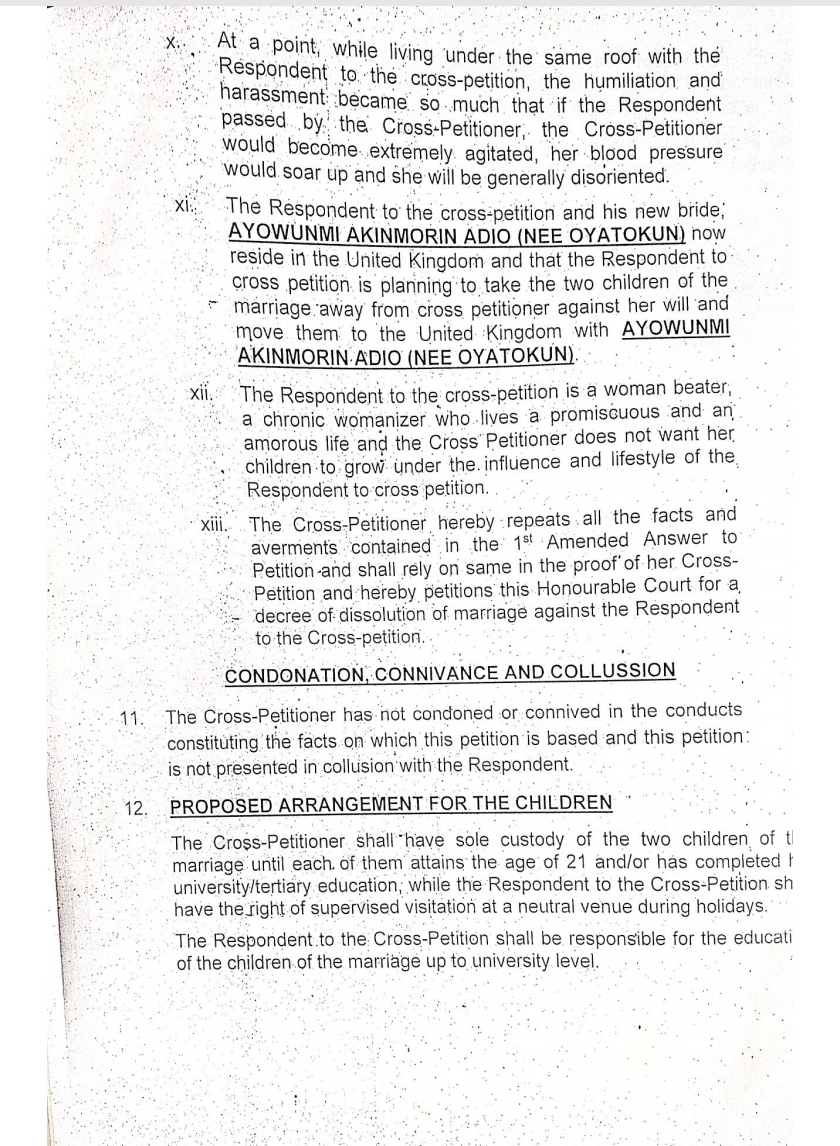
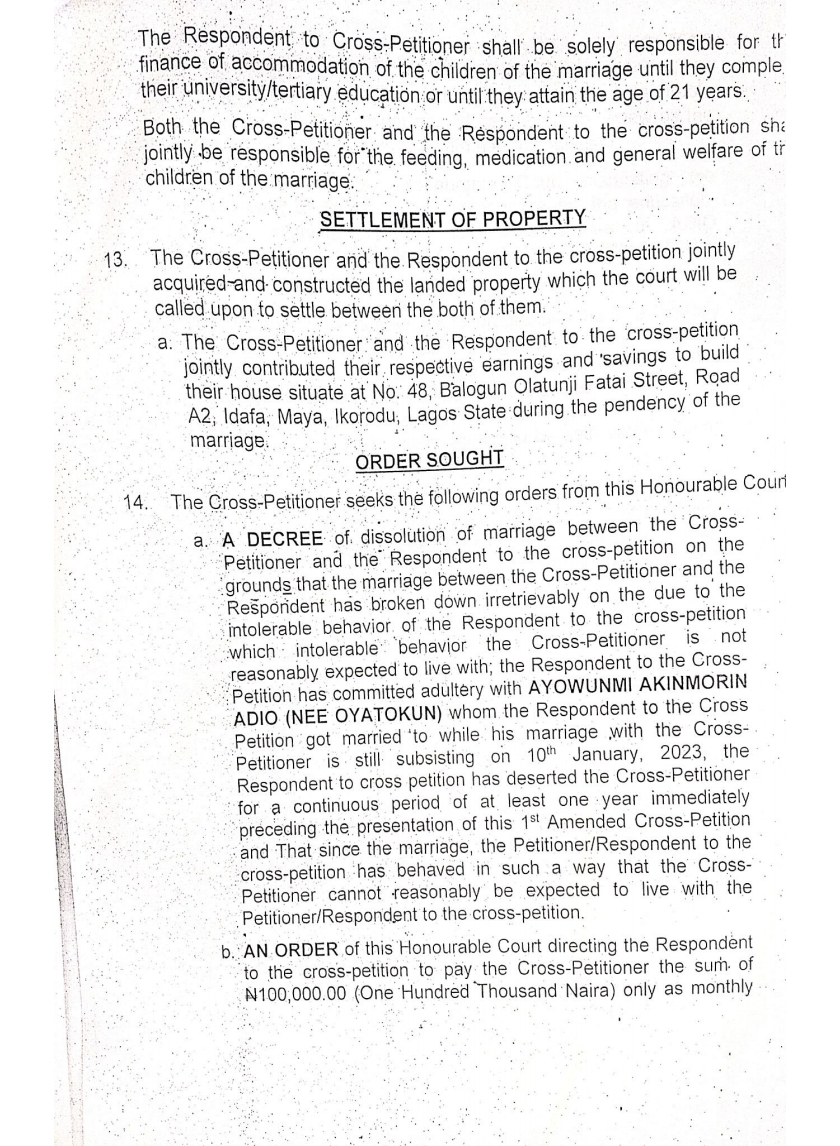

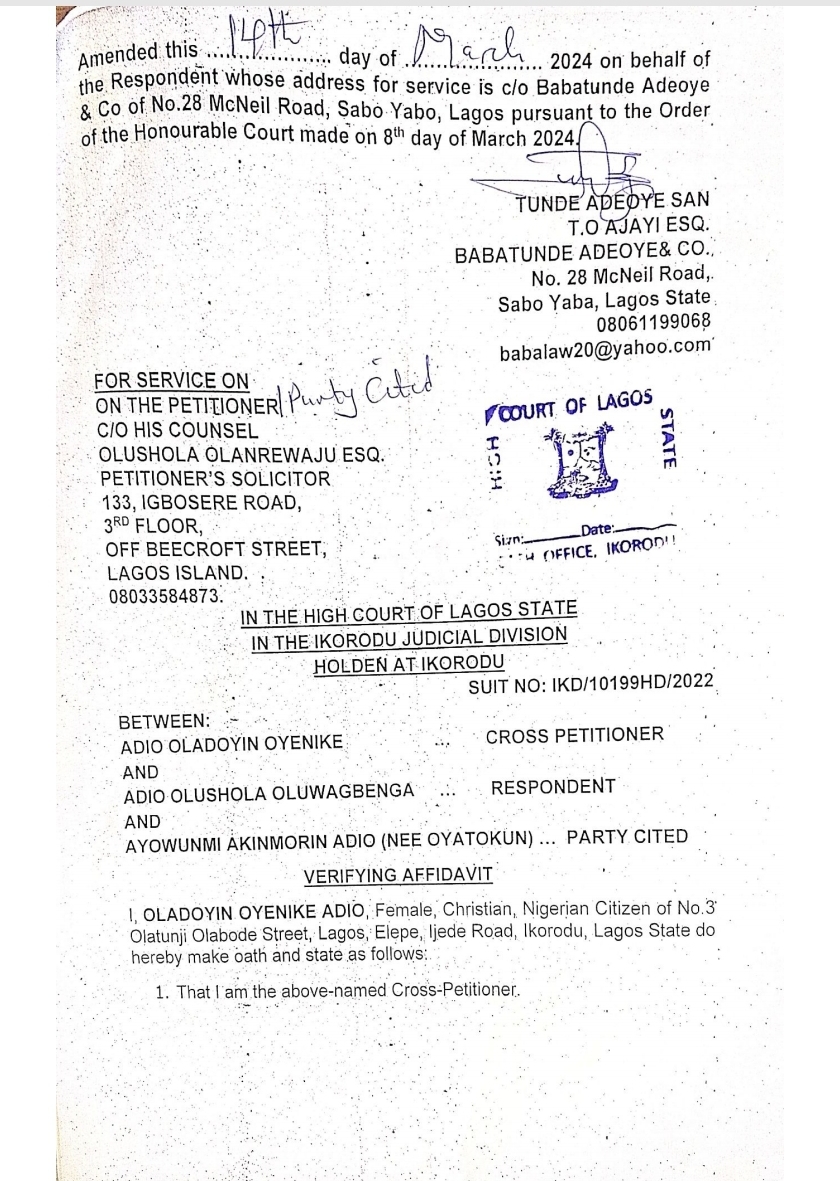
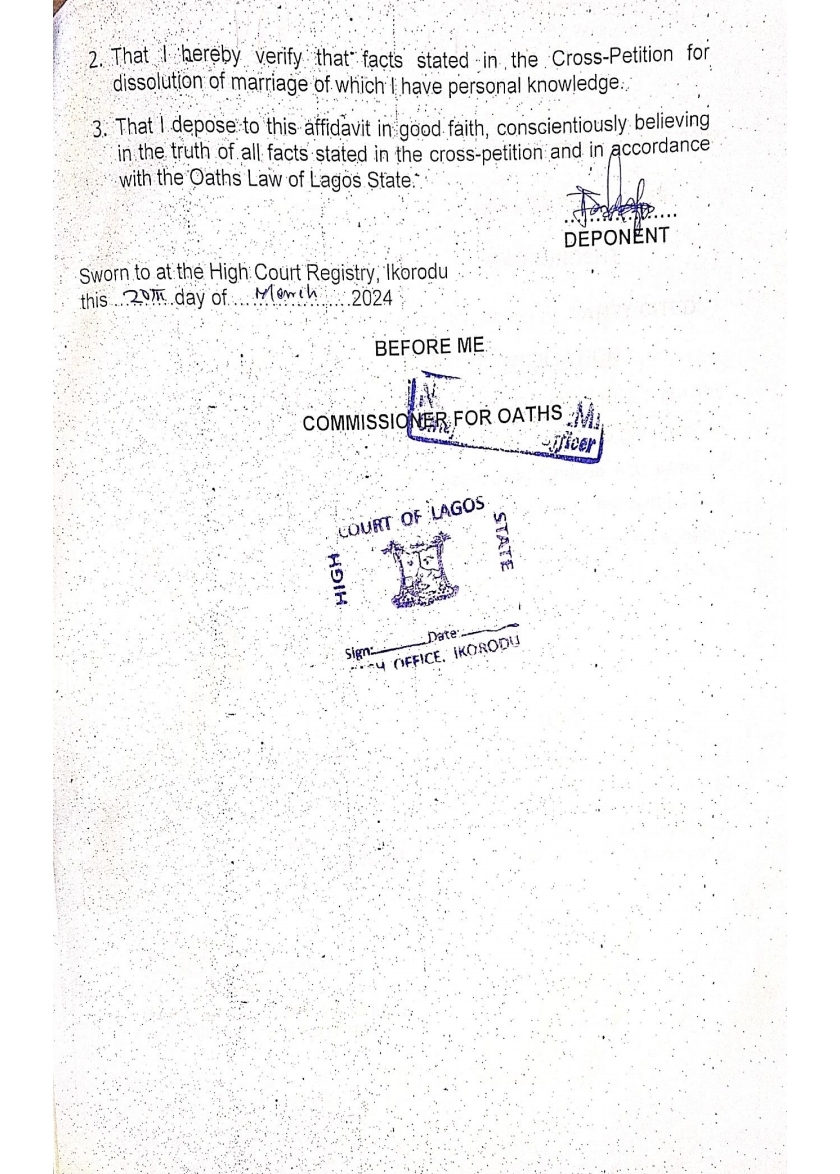
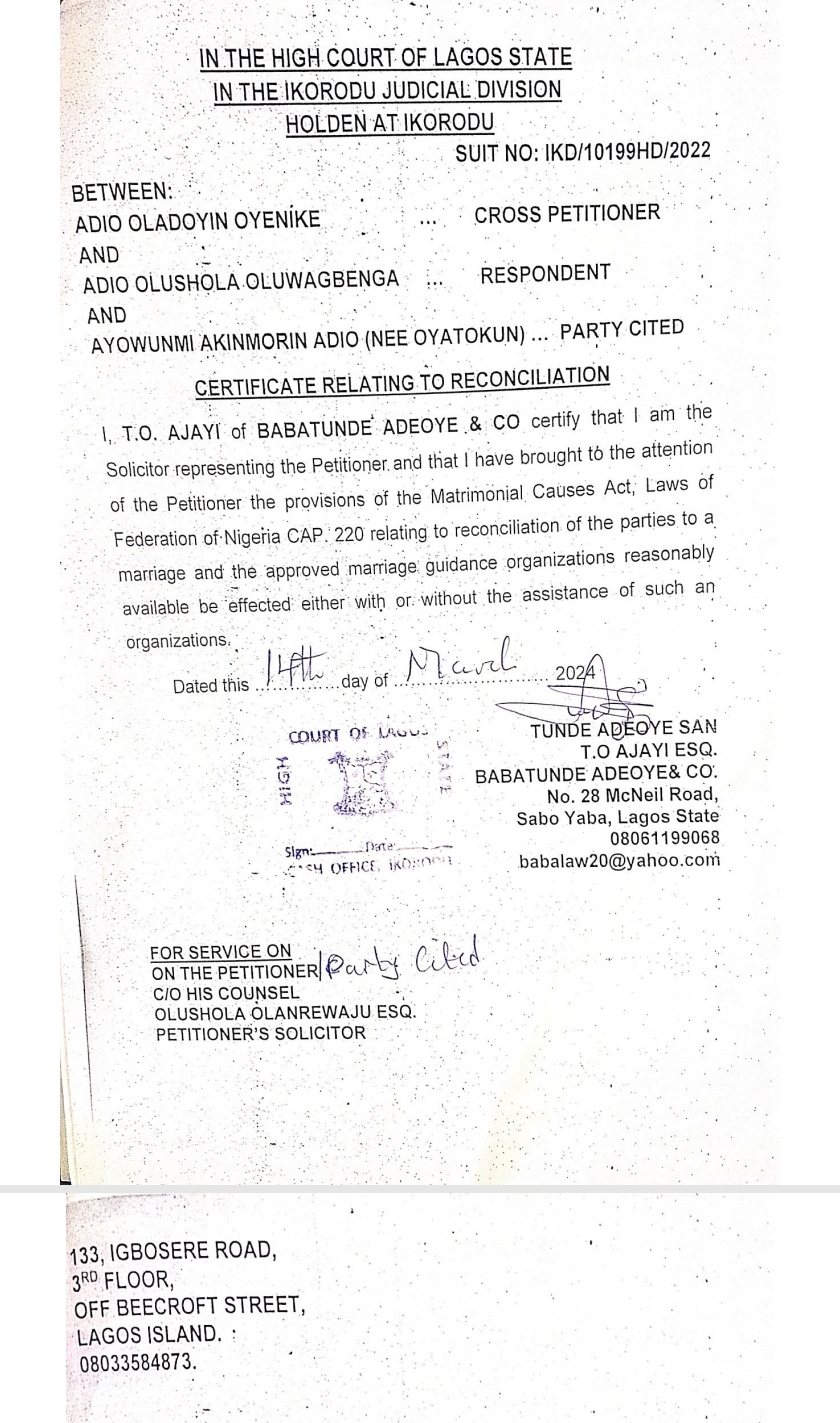
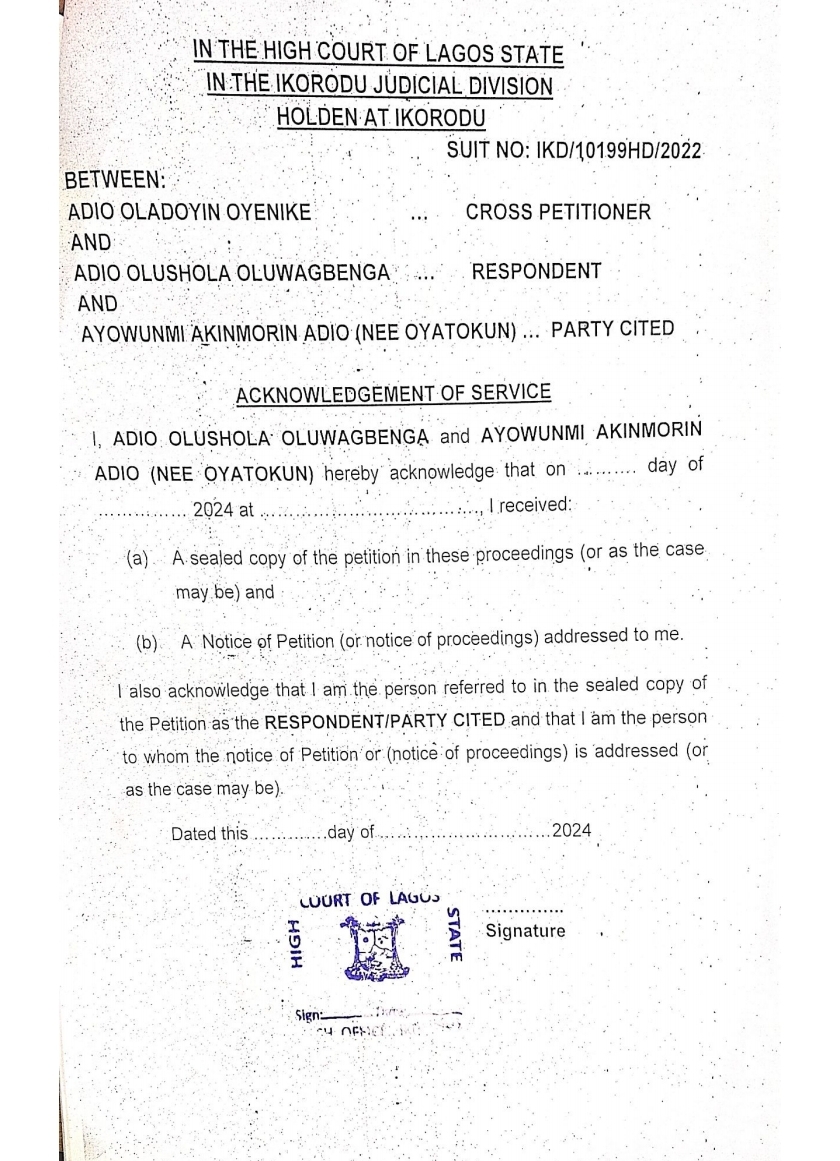
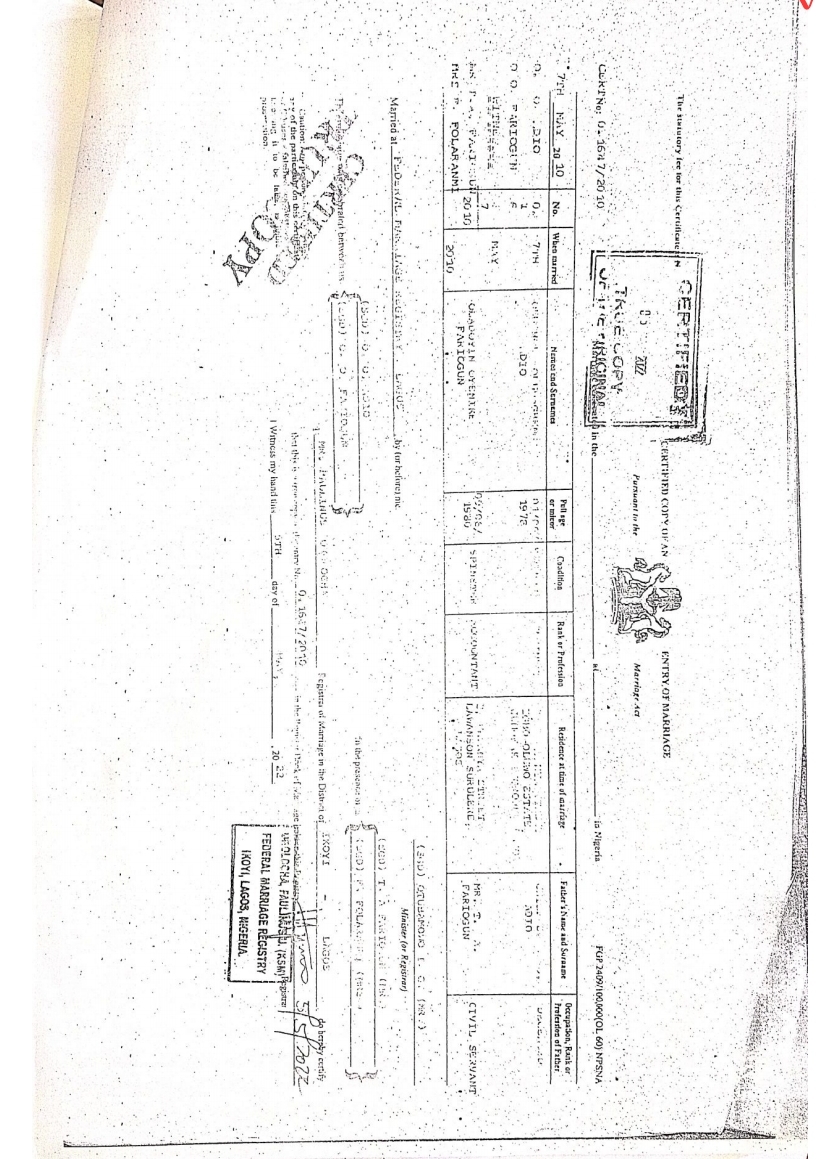
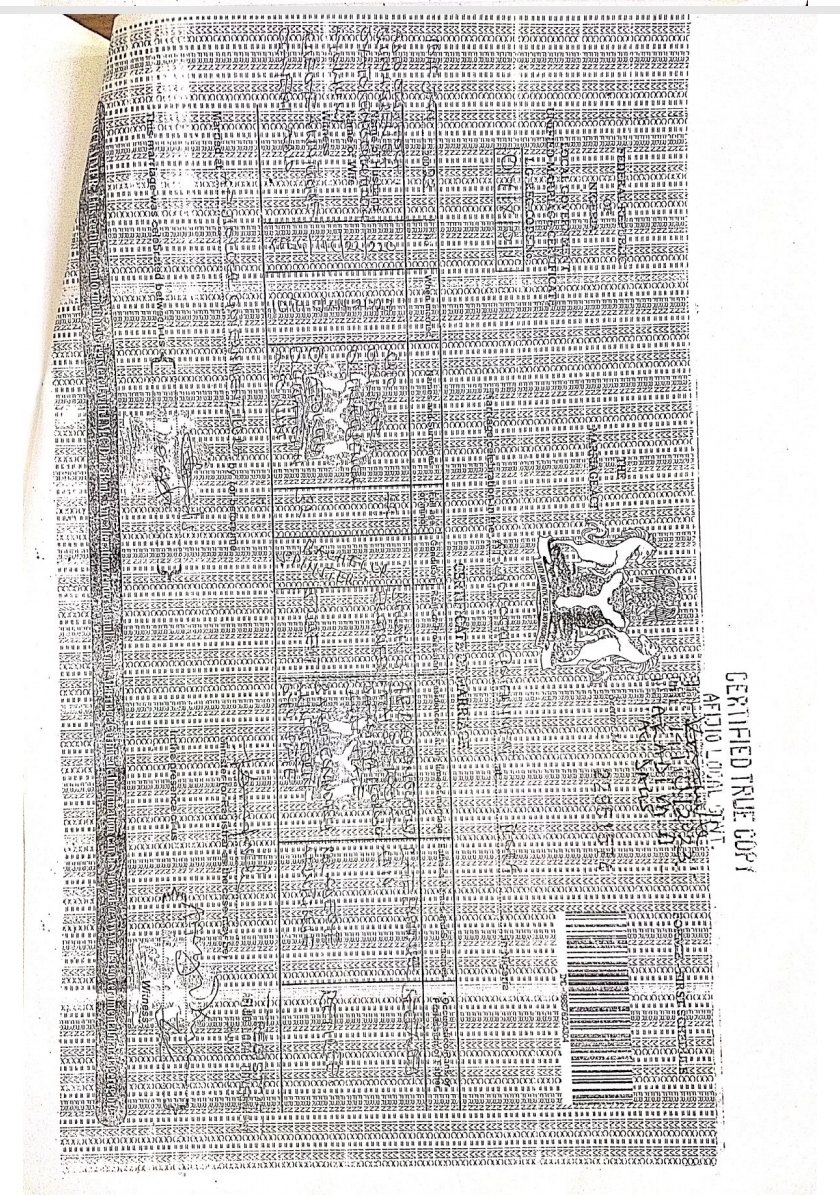
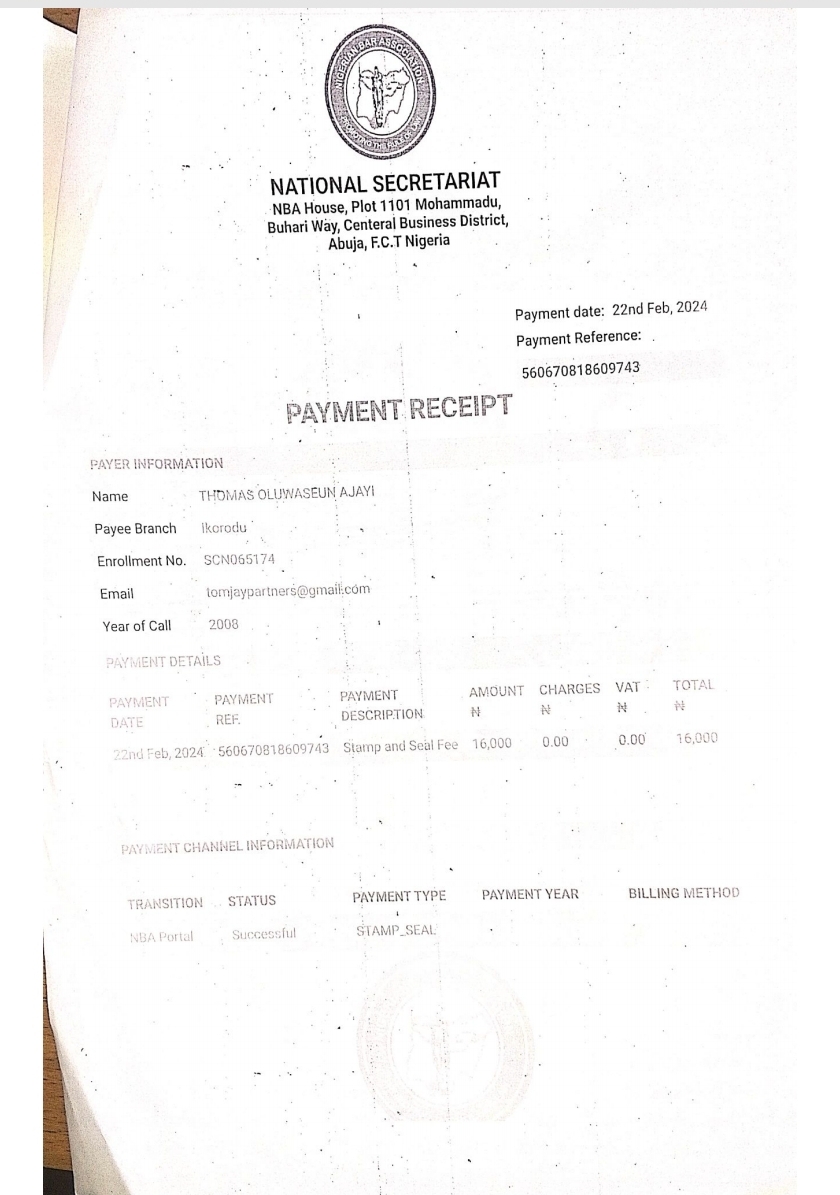
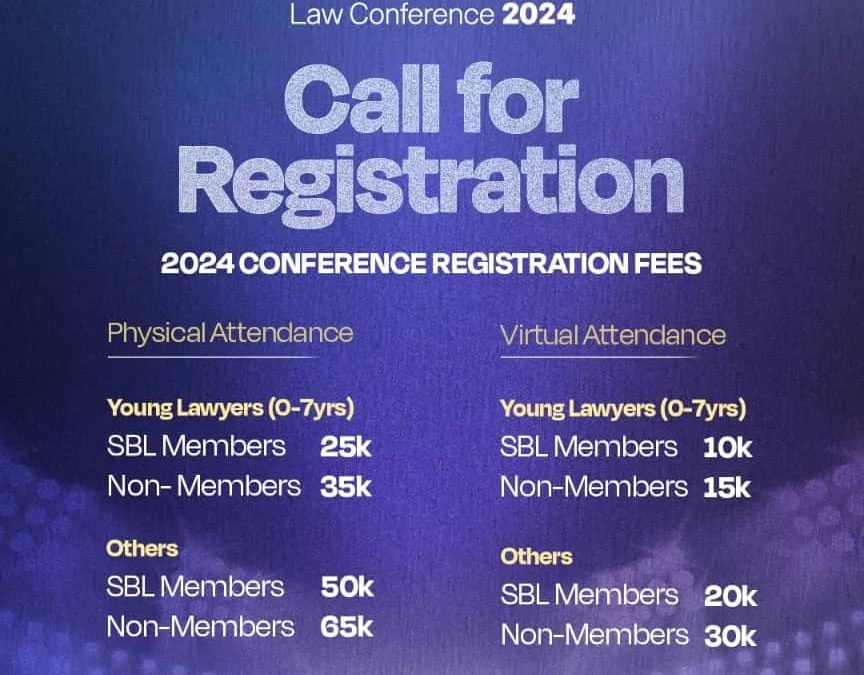
by Legalnaija | May 8, 2024 | Uncategorized
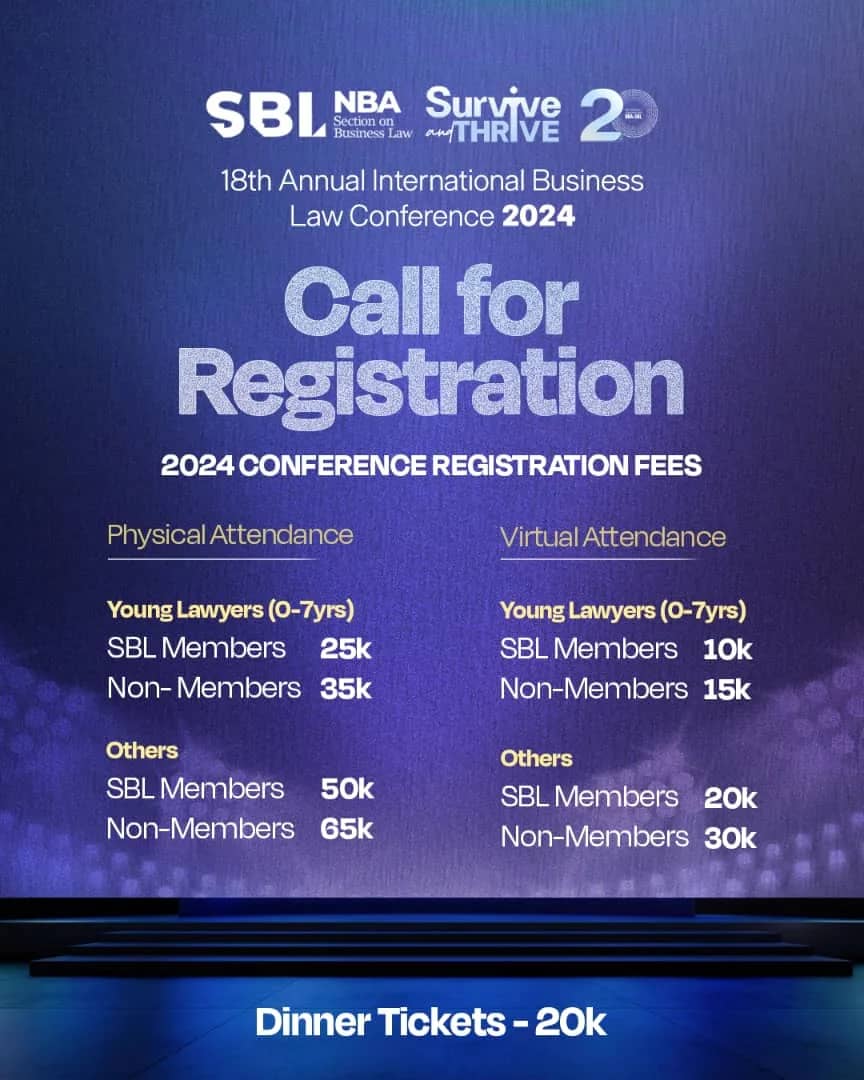
Lagos, Nigeria – The Nigerian Bar Association, Section on Business Law (NBA/SBL) is excited to announce the opening of registration for its highly anticipated 18th Annual Law Conference. Legal professionals are invited to register starting May 1st, marking the commencement of what promises to be another transformative event in the legal community.
Scheduled to take place from from the 26th to the 28th of June, 2024 at the Abuja Continental, Federal Capital Territory, Abuja, the NBA/SBL 18th Annual Law Conference themed survive and THRIVE is focused on discussions around emerging trend, insights, and innovative strategies for navigating and shaping the future of law.
In addition to offering valuable learning and networking opportunities, the conference will feature sponsorship opportunities specifically tailored for young lawyers. Lawyers with 0 to 3 years of post-call experience, not more than 25 years of age, and have paid for their 2024 Bar Practicing Fees (BPF) and NBA-SBL dues, are eligible to apply for these sponsorships.
Registration fee for the NBA/SBL conference is as follows: Physical attendance for young lawyers with 0-7 years post-call experience who are members of the SBL are to pay the sum of N25,000 while Non-members are to pay N35,000. Practicing lawyers with more than 7 years post-call experience who belong to the SBL are to pay N50,000 while Non-members are to pay N65,000.
Virtual attendance on the flip side for young lawyers with 0-7 years post-call experience who are members of the SBL are to pay the sum of N10,000 while Non-members are to pay N15,000. Practicing lawyers with more than 7 years of experience who belong to the SBL are to pay N20,000 while Non-members are to pay N30,000. With dinner tickets slated for N20,000.
“We are thrilled to open registration for the NBA/SBL 18th Annual Law Conference and to introduce yet again sponsorship opportunities for young lawyers,” said Ose Okepu, Chair of the NBA/SBL Conference Planning Committee. “More details about these sponsorships will be shared shortly, so stay tuned for updates.”
Registration will be available exclusively through the official conference website, https://conference.nbasbl.org. Attendees can visit the website starting May 1st to secure their spot at this premier legal event. Early registration is encouraged to take advantage of special rates.
Don’t miss your chance to be a part of this transformative event. Register on May 1st and join us for an enriching experience at the NBA/SBL 18th Annual Law Conference.
For more information, please visit the NBA-SBL website at www.nbasbl.org or contact the Conference Secretariat at info@nbasbl.org. Also follow us on all social media platforms to stay updated. Please visit NBA-SBL on Instagram – @nbasbl and Twitter – @nbasblofficial.
************************************
About the NBA SBL: The Nigerian Bar Association Section on Business Law Is committed to advancing the practice of business law within the legal community. Through conferences, publications, and educational initiatives, NBA SBL provides a platform for legal professionals to stay informed and connected.
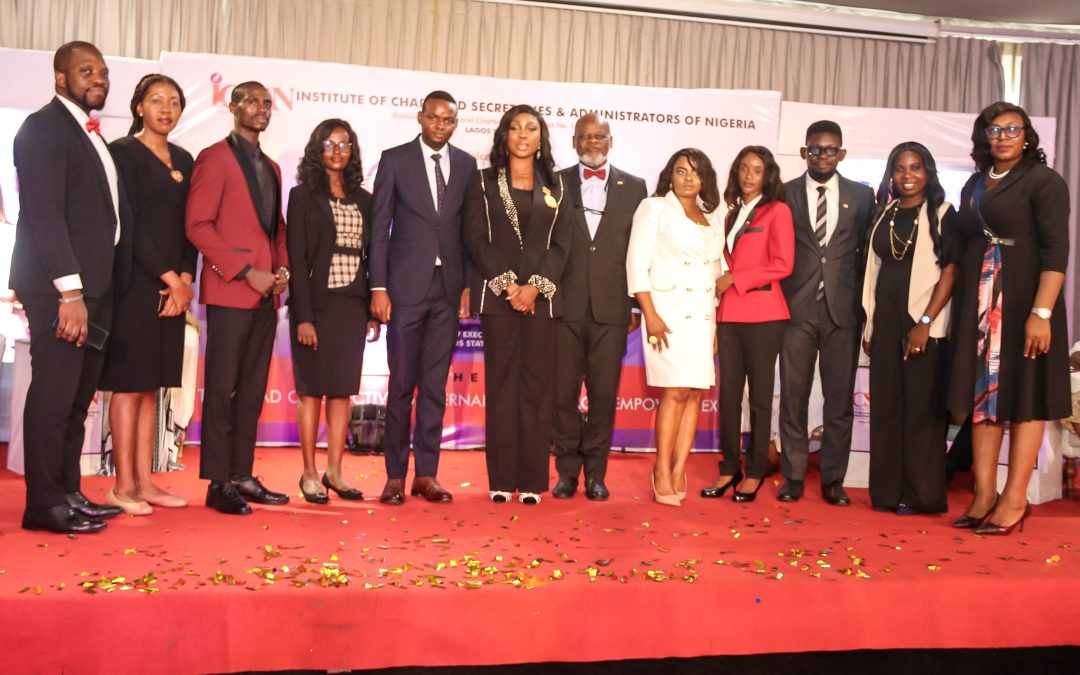
by Legalnaija | May 5, 2024 | Uncategorized
ICSAN Lagos State Chapter gets new Chairman and Executives
Lagos State Chapter of the Institute of Chartered Secretaries and Administrators of Nigeria (ICSAN), ushers in a New Chairman and Executives.
Last weekend, the Lagos State Chapter held the Investiture Ceremony of its 12th Chairman, Efosa Ewere, FCIS, and induction of the Executive Committee Members at Radisson Blu Anchorage, Victoria Island, Lagos
The formal event Chaired by Mr. Olatunde Busari, SAN, FCIS, C.Arb was attended by seasoned governance professionals including members of the Governing Council of Institute of Chartered Secretaries and Administrators of Nigeria (ICSAN) and Non- members.
Busari praised Ewere’s attributes of discipline, hard work and commitment to excellence which he said remained consistent through the years he worked with her in various professional capacities.
Mr. Tolu Odukale, a partner and Head of Governance, Risk and Compliance at the Lagos office of KPMG Advisory Services delivered the keynote address themed, “The Triad of Effective Governance: Engage, Empower and Excel,”
Highlighting the germane role of effective governance to business growth and sustainability, Odukale charged members of corporate boards to deploy these tripartite structure of engagement , empowerment and excellence in the strategic governance of their respective organisations.
In her address, the President Institute of Chartered Secretaries and Administrators of Nigeria (ICSAN) and Chairman of the Governing Council, Mrs. Funmi Ekundayo, FCIS, urged members to continue to promote professionalism and ethical standards ICSAN represents.
Congratulating Ewere and the newly inducted executive committee members, Ekundayo expressed a strong conviction that Ewere was capable of leading the Lagos Chapter to achieve greater strides as the flagship chapter.
She advocated for increased collaboration among the different chapters of ICSAN for the benefit of the institute.
In her acceptance speech, the 12th Chairman of ICSAN Lagos Chapter, Ewere, acknowledged the strong foundation laid by past leaders of the Lagos State Chapter and pledged to grow the Lagos Chapter by strengthening capacity of members across all cadres, and promoting knowledge of corporate governance to the grassroots.
High points of the ceremony included the decoration of the 12th Chairman and Oath taking of Allegiance by the EXCO members-
Adebola Babatunde, FCIS – Vice Chairman
Chief Adewale Adeniji, ACIS – Honourary Secretary
Clementina Ramsey-Osere, ACIS- Treasurer
Dauda Amedu Young-David, ACIS- Financial Secretary
Julie Bassey, ACIS – Mobilisation Secretary
Temidayo Odulaja, FCIS – Social Secretary
Irene Attoe, ACIS – Publicity Secretary
Damilola Akinpelu ,ACIS- Assistant Honourary Secretary
Oyekunle Olunukola Idowu, ACIS- Assistant Financial Secretary
Ufuoma Mamoke Ovesuor, ACIS – Assistant Publicity Secretary
Oladoyin Onanuga, ACIS – Assistant Mobilisation Secretary
Alaba Ekundayo, FCIS – Ex-Officio
We bid the 12th Chairman Ms. Efosa Ewere FCIS and the EXCO hearty Congratulations and a successful tenure.

by Legalnaija | May 3, 2024 | Uncategorized
Why Legal Agreements and Proper Records are Essential, Even Among Friend
When entering into business with friends, it’s easy to rely on trust and verbal agreements. However, the importance of formalizing such arrangements through legal agreements and maintaining proper records cannot be overstated. Here’s why:
Clarity of Terms: Legal agreements ensure that all parties have a clear understanding of their rights and obligations. This clarity prevents misunderstandings that could strain relationships.
Protection of Interests: Contracts protect the interests of all involved. They serve as a safeguard against unforeseen circumstances, ensuring that personal relationships do not cloud business judgments.
Dispute Resolution: Should disagreements arise, a written agreement provides a framework for resolution. It outlines the agreed-upon terms and can prevent costly legal battles.
Professionalism: Maintaining proper records and legal agreements reflects a professional approach to business. It demonstrates respect for the venture and the individuals involved.
Future Growth: As businesses grow, the need for formal documentation becomes even more critical. Early adoption of this practice sets a strong foundation for future expansion.
Remember, friendships are precious, and so are your business endeavors. Protect both by insisting on proper legal documentation, no matter how close you are with your business partners.
If you need to document your business dealings with friends or others, you can create, customize and download your agreements in less than 5 minutes using our automated contracts available via this link: https://app.legalnaija.com/shop/templates
#LegalAgreements #BusinessEthics #FriendshipAndBusiness











































